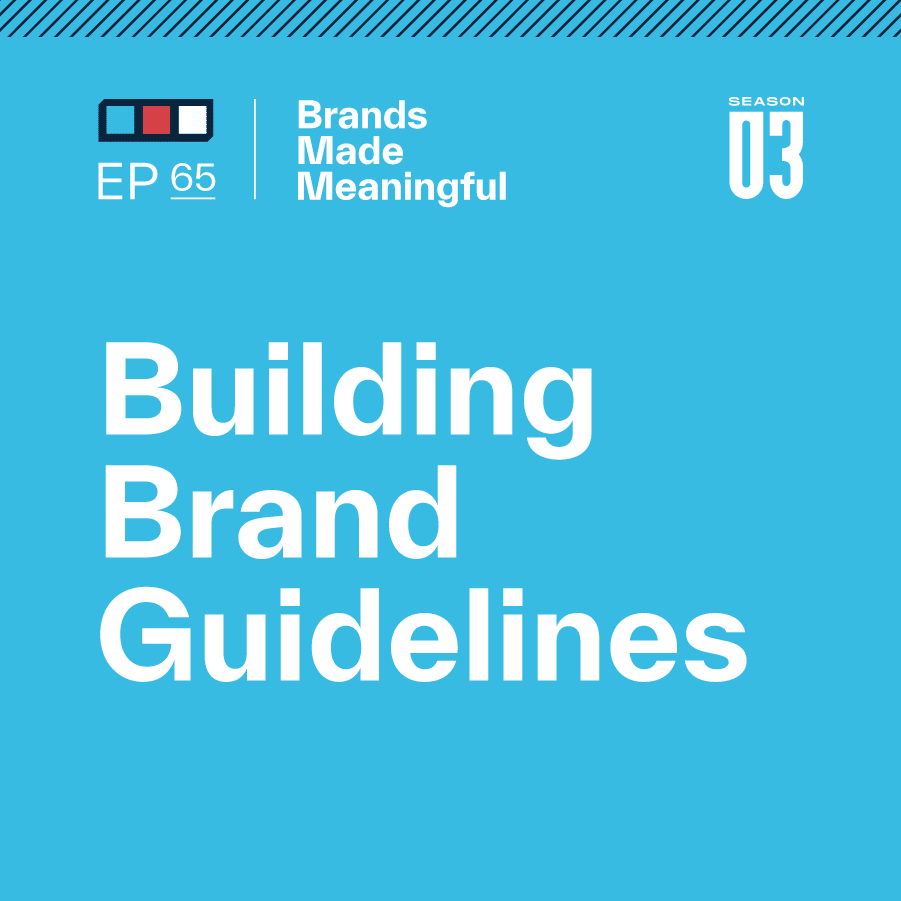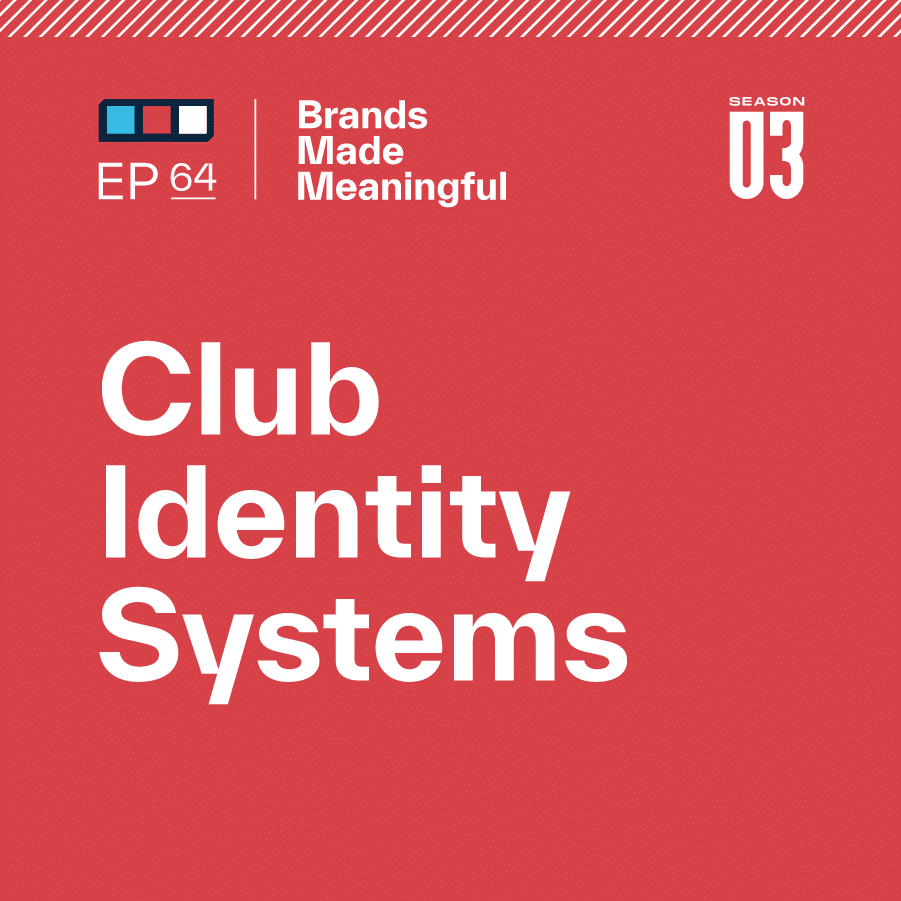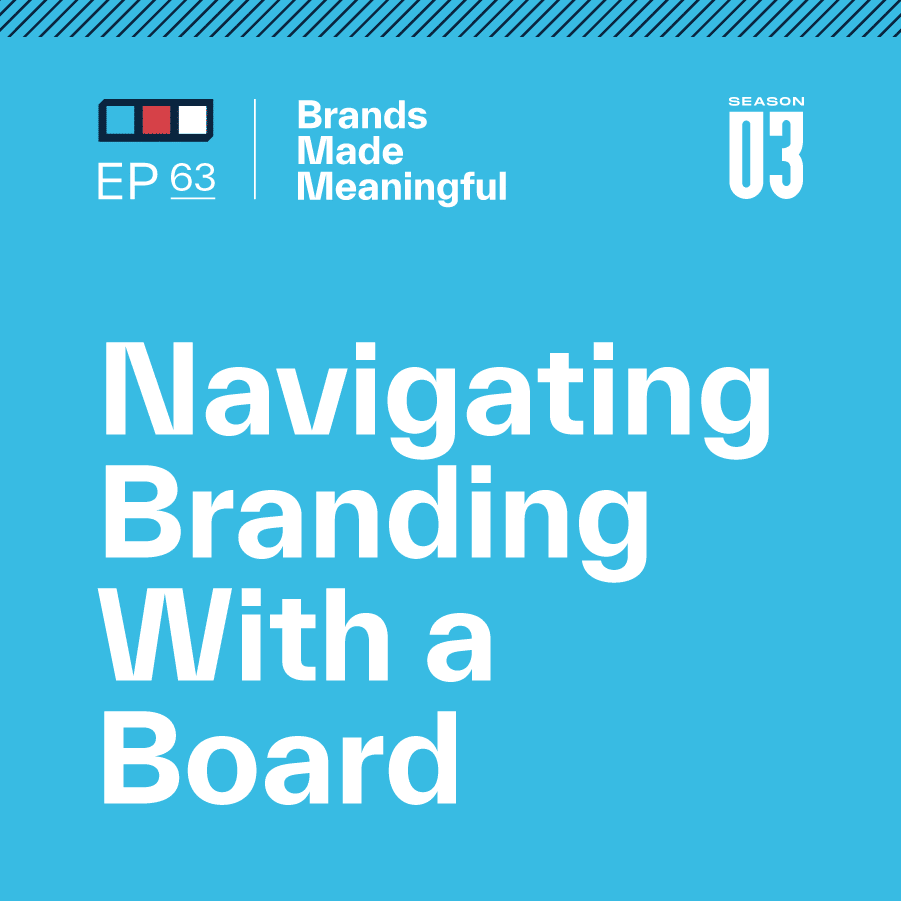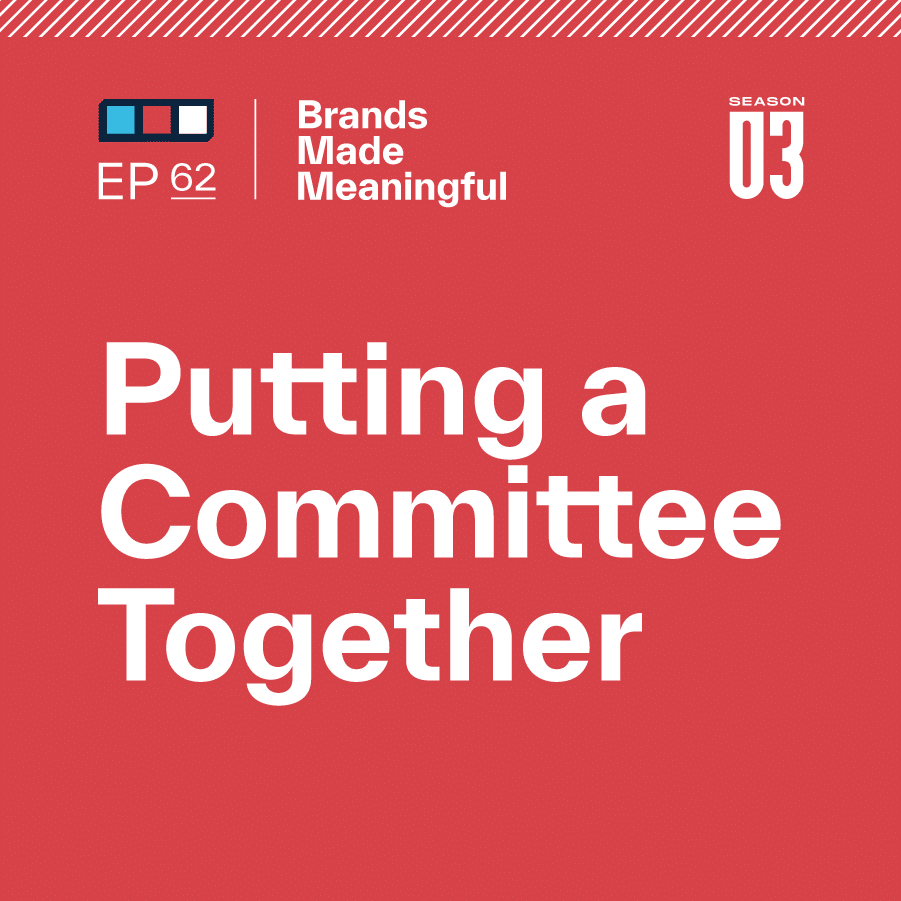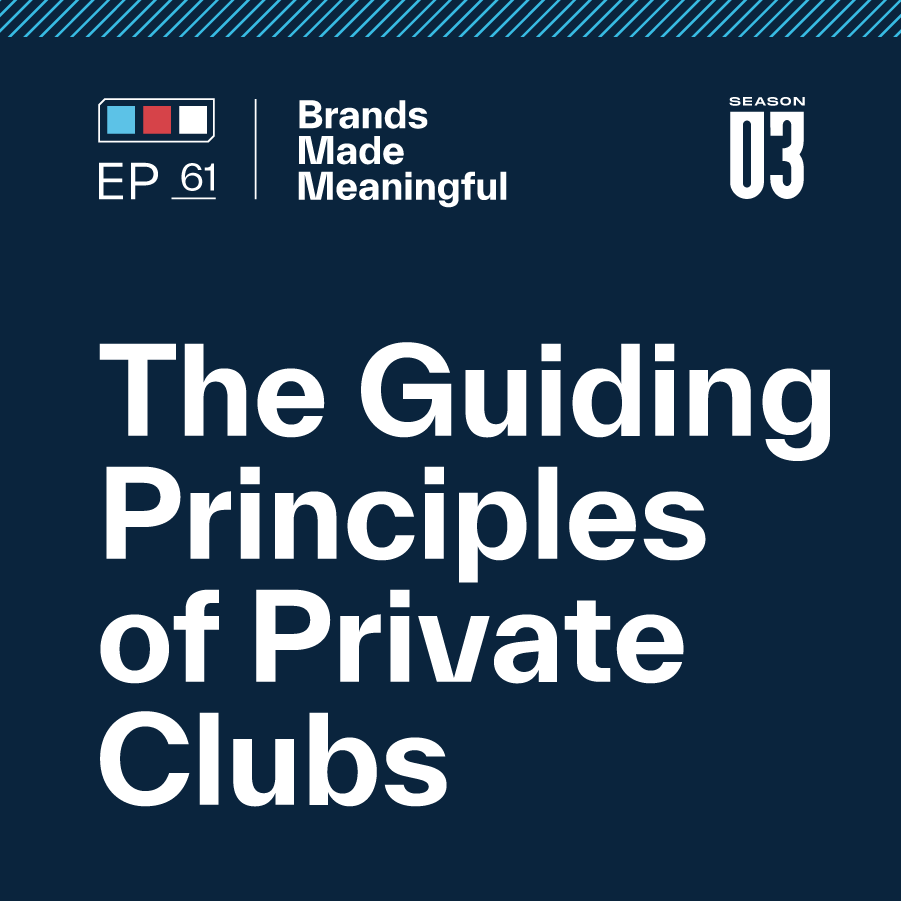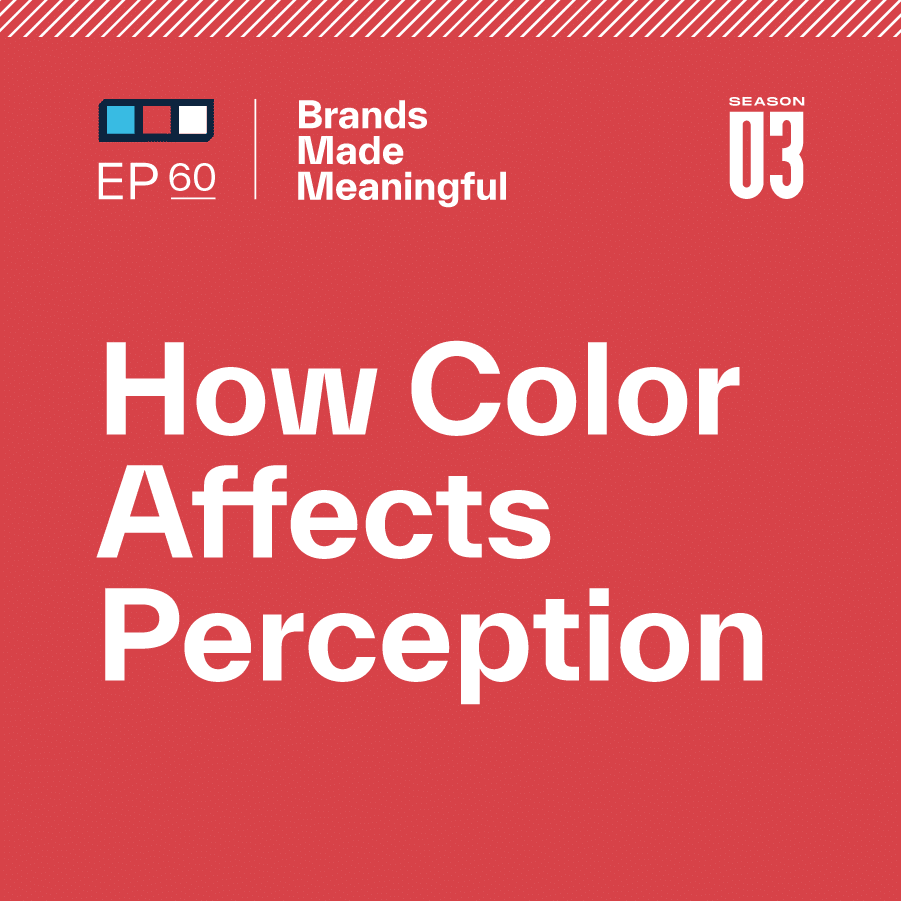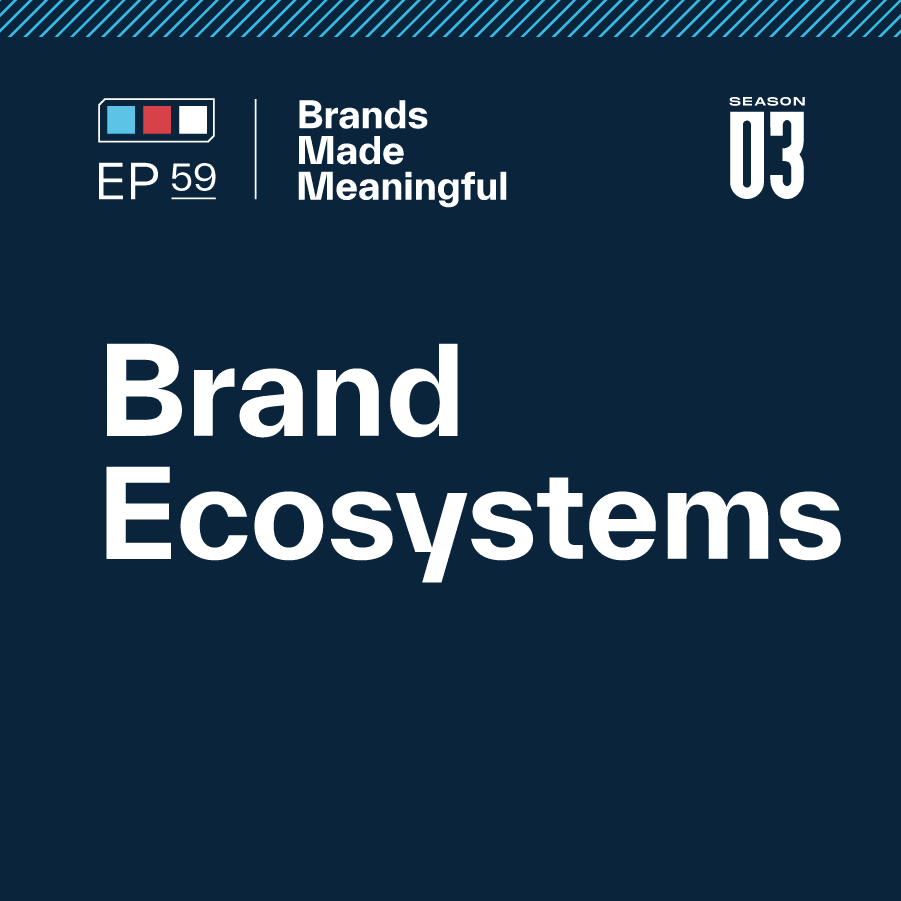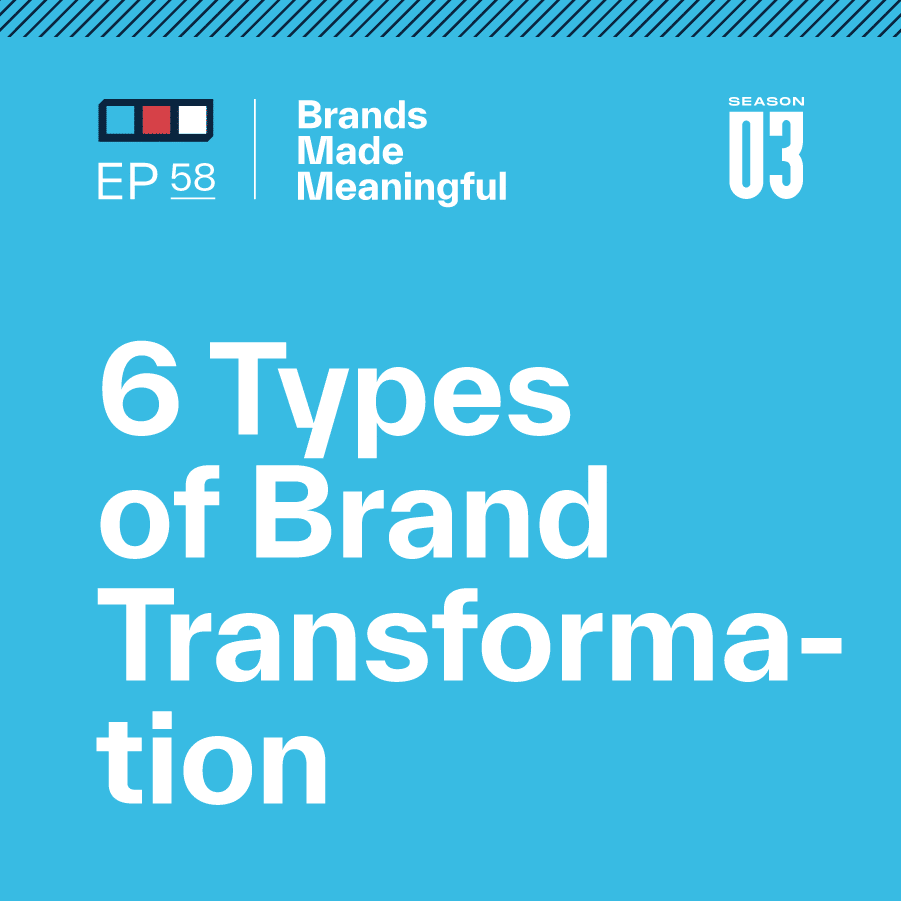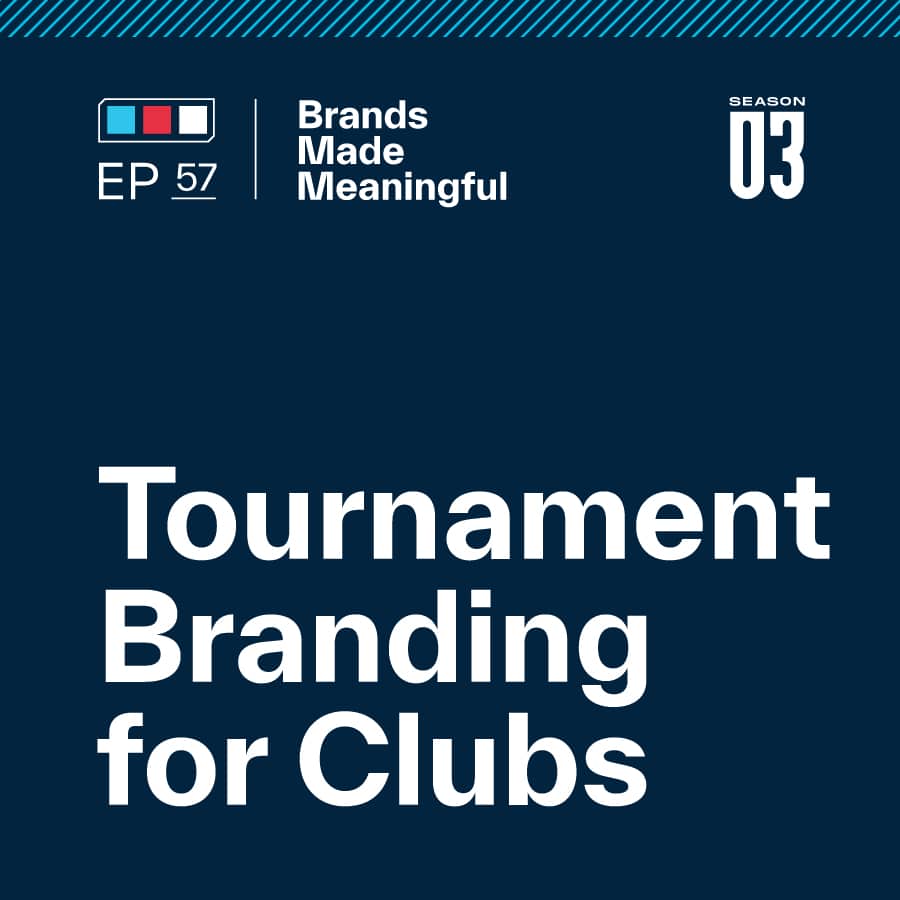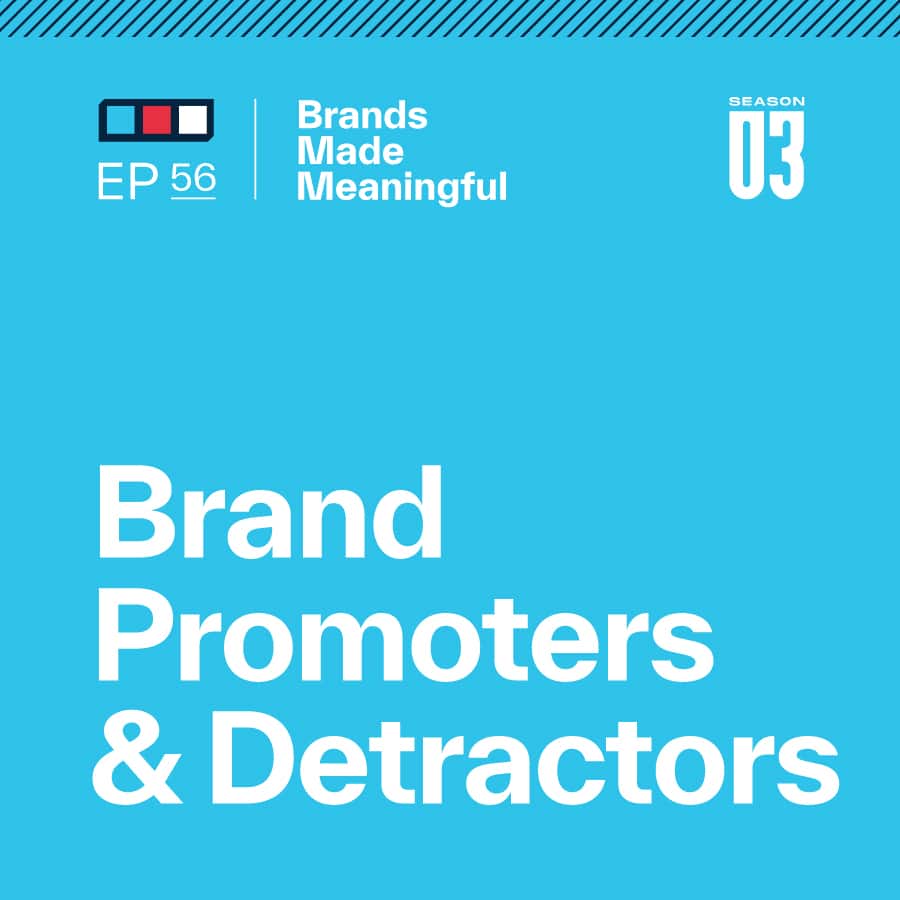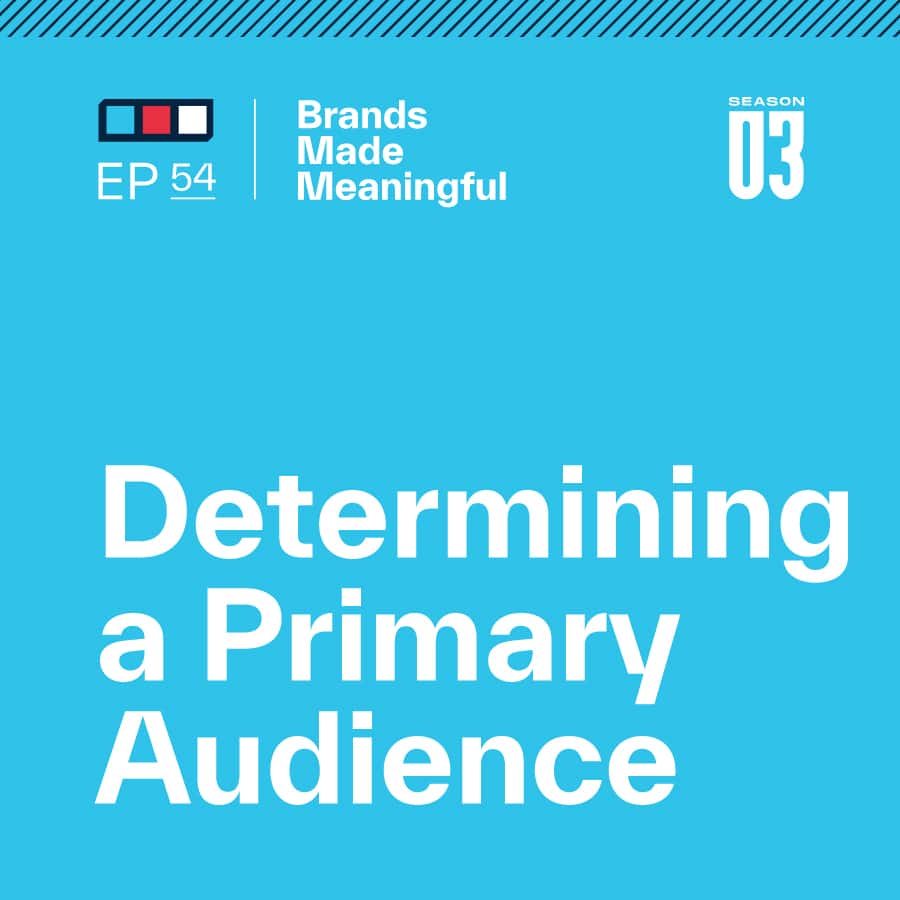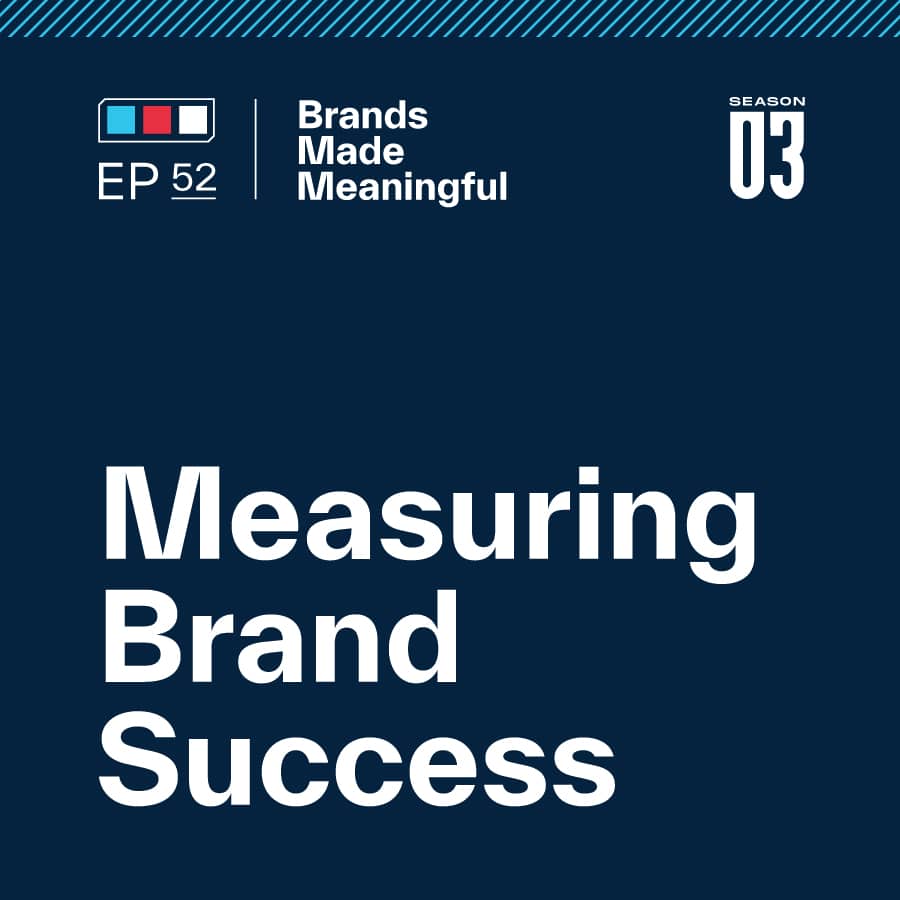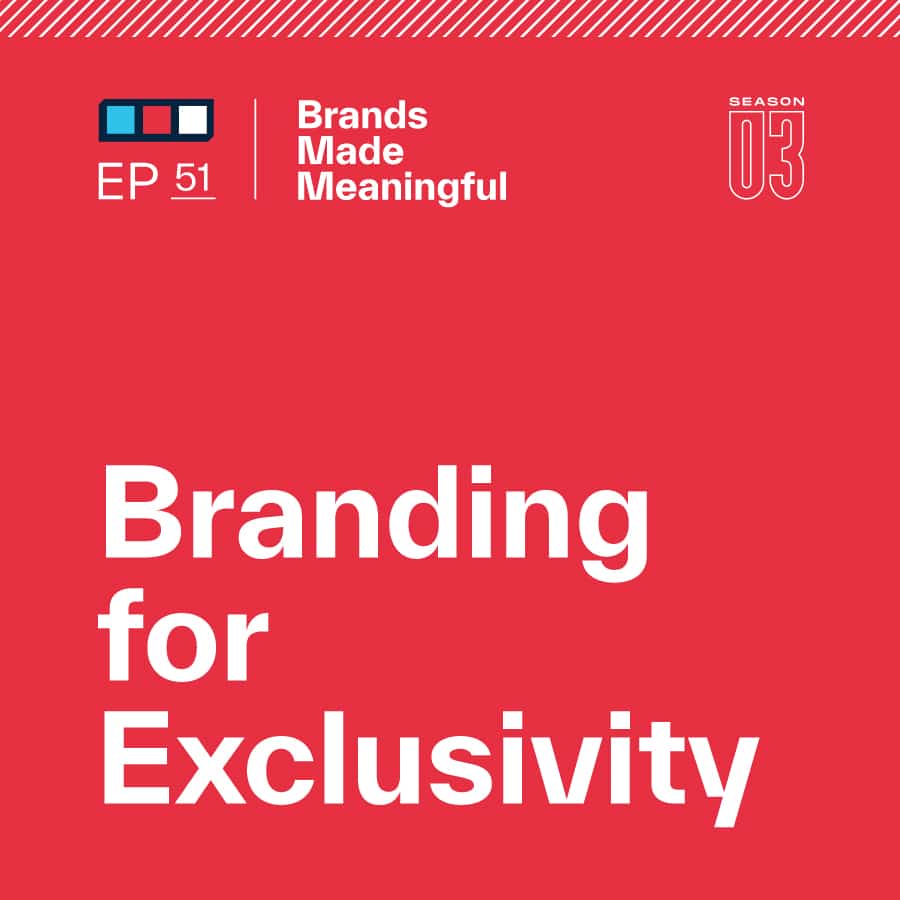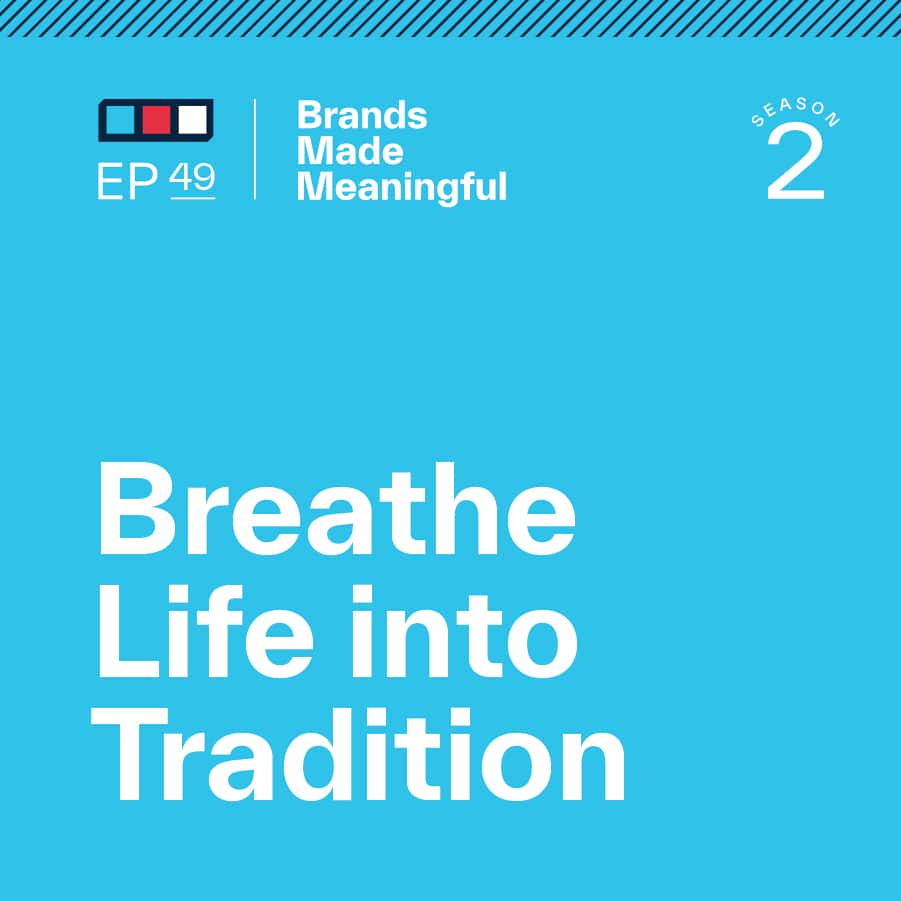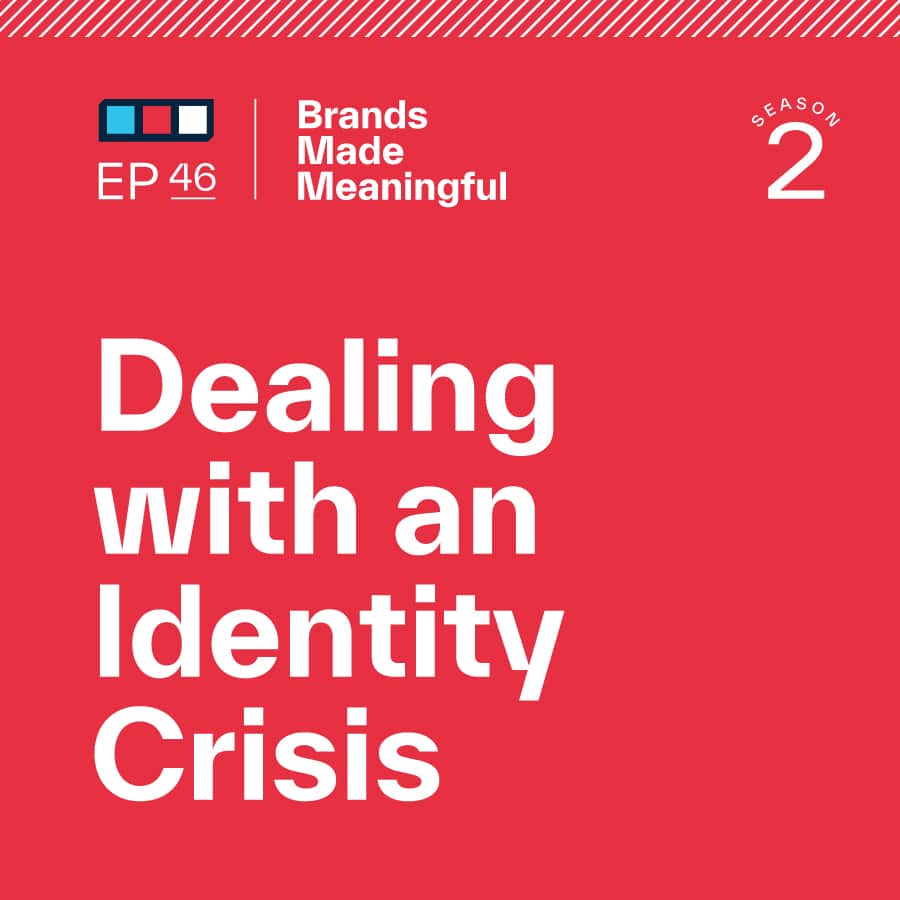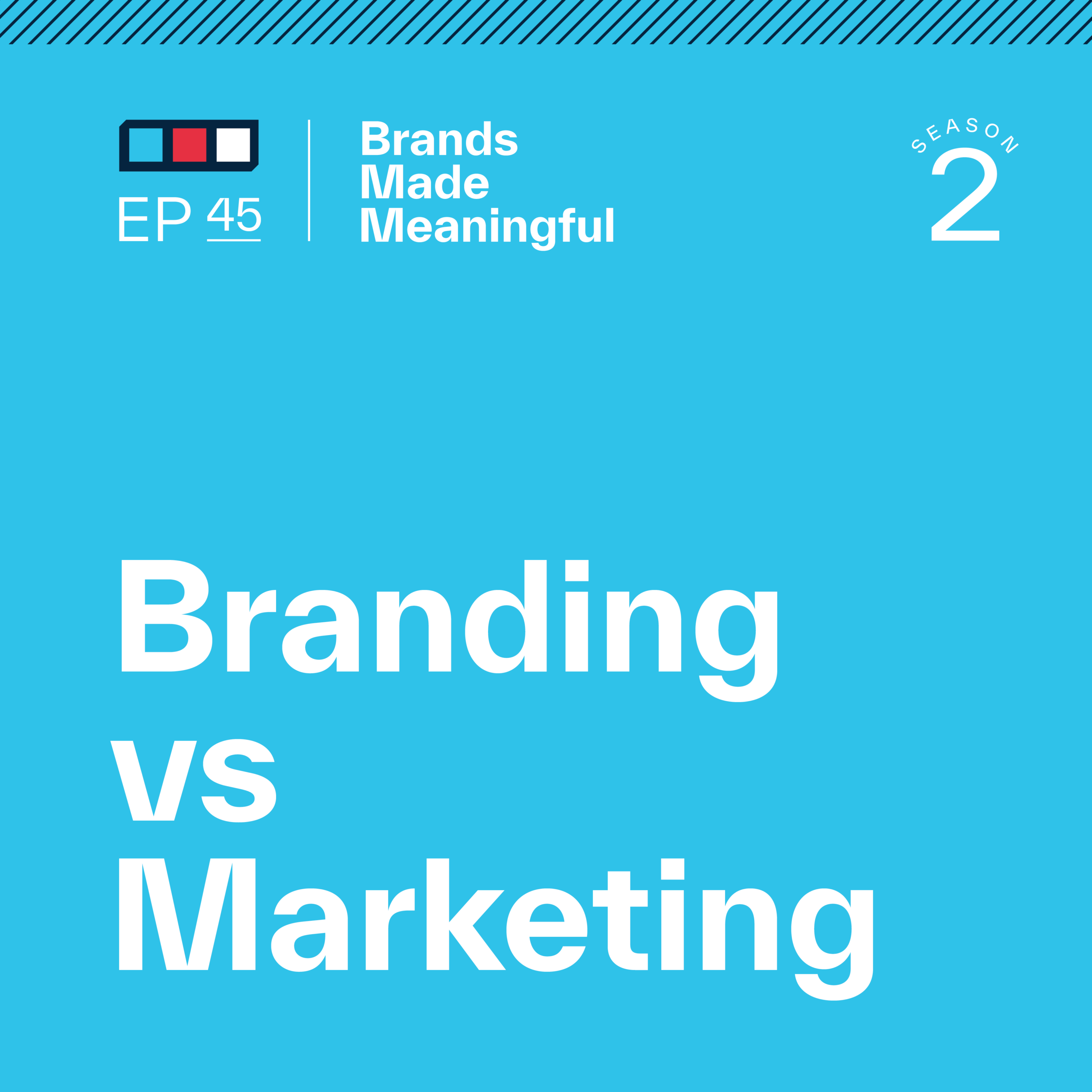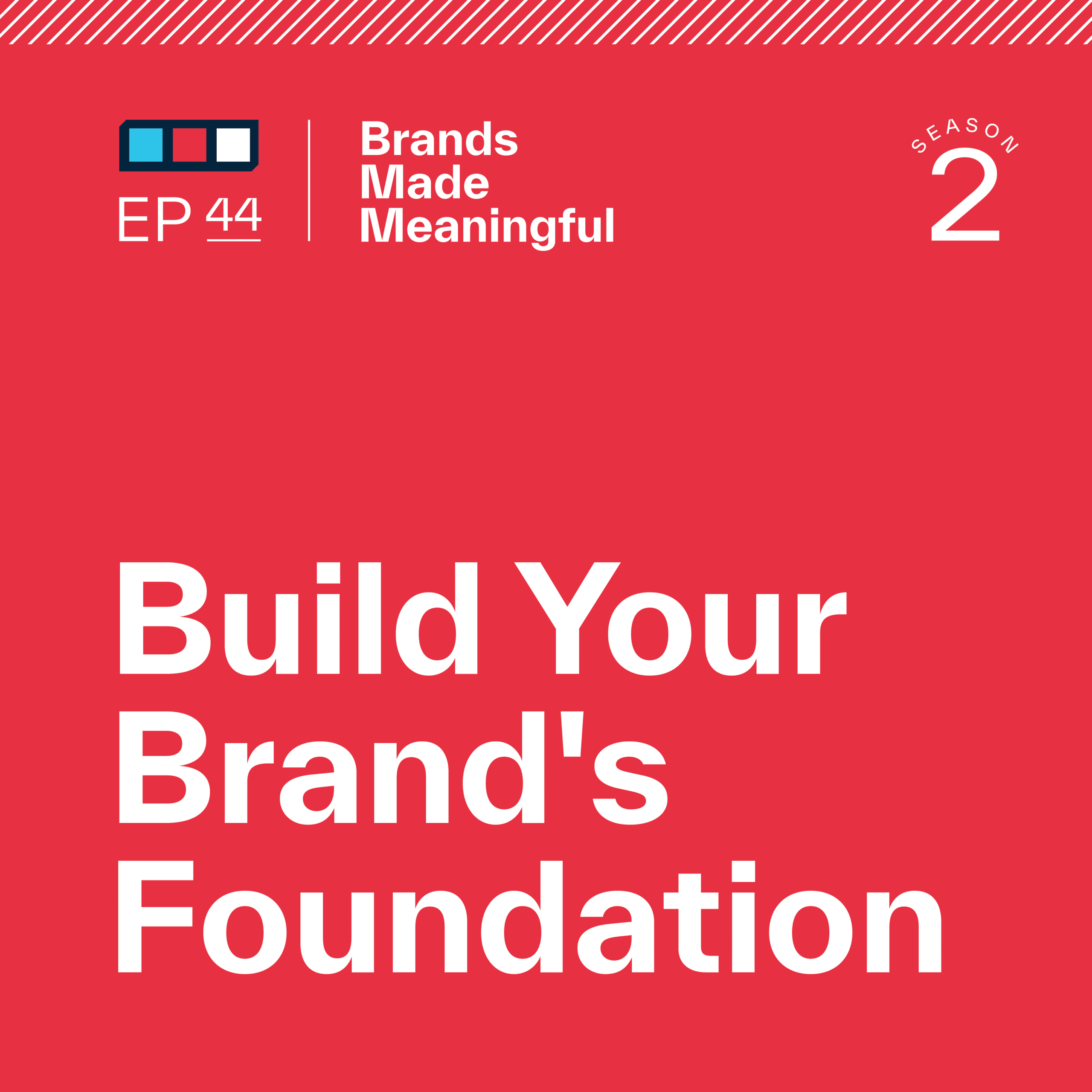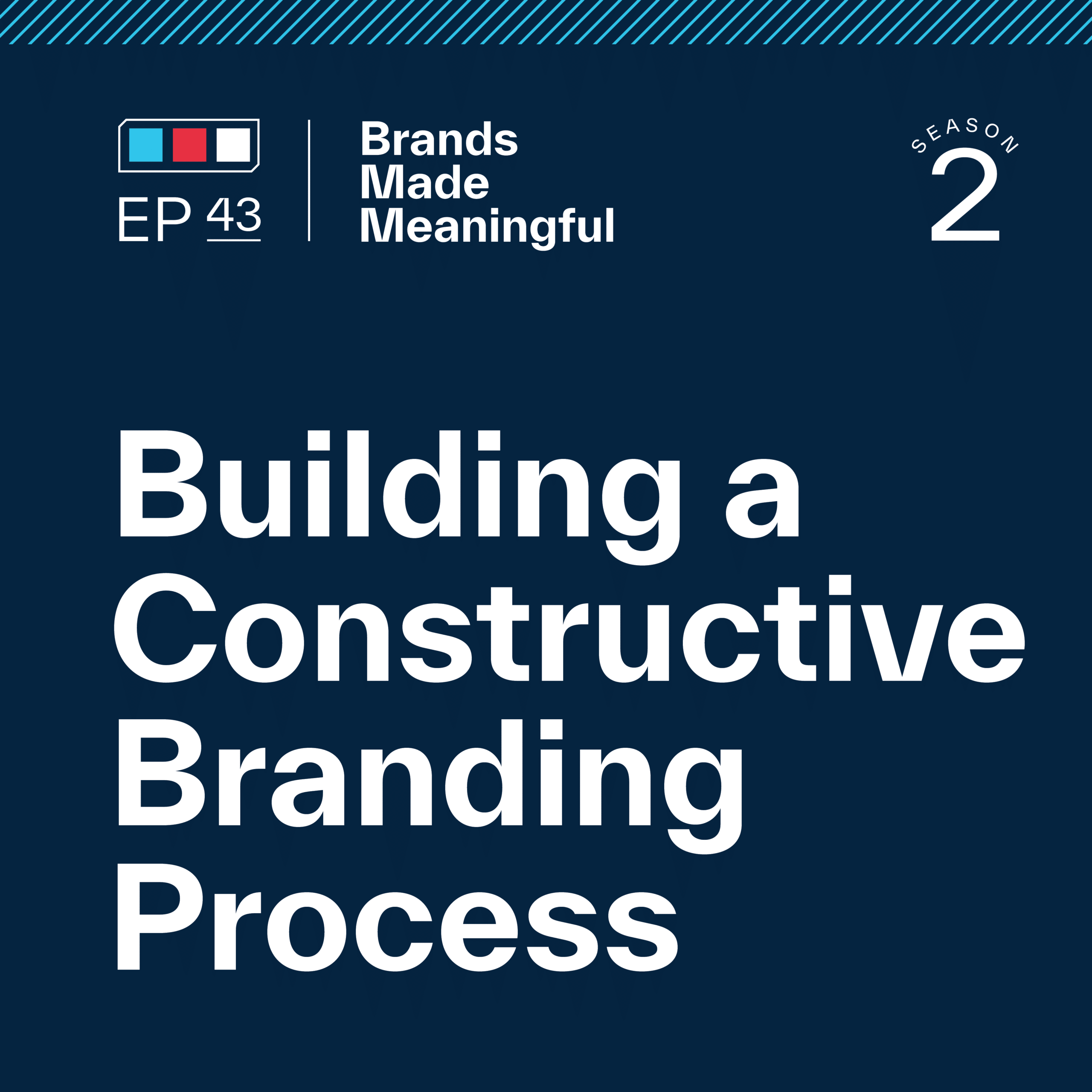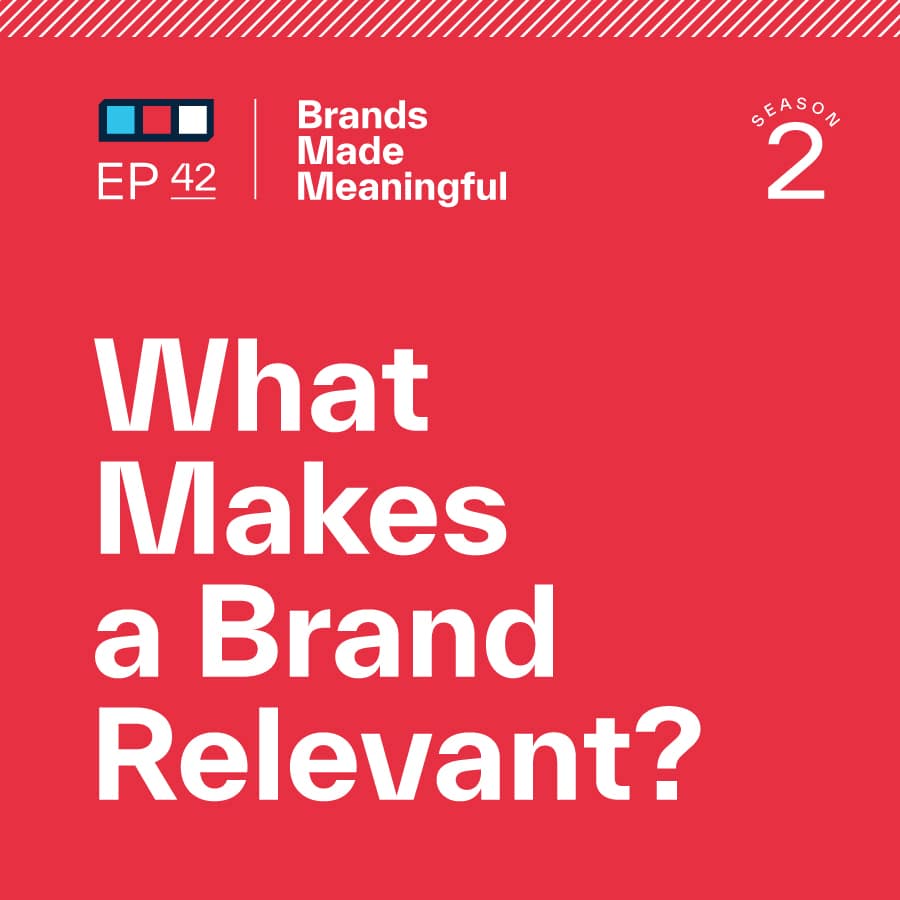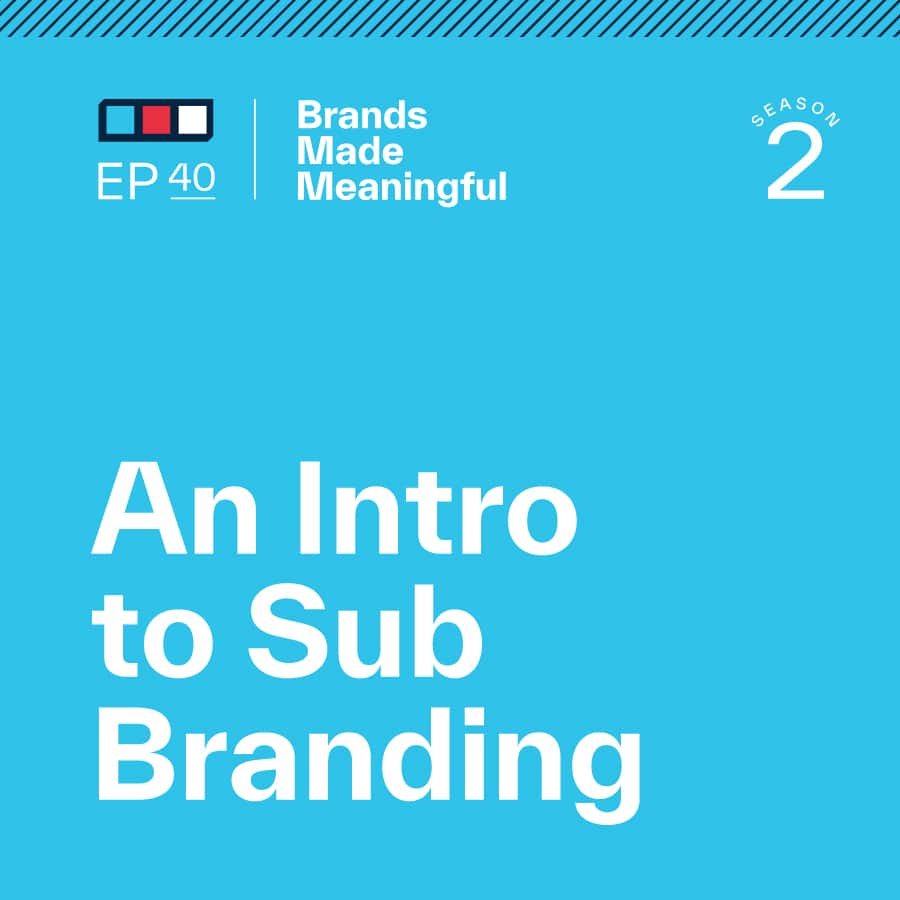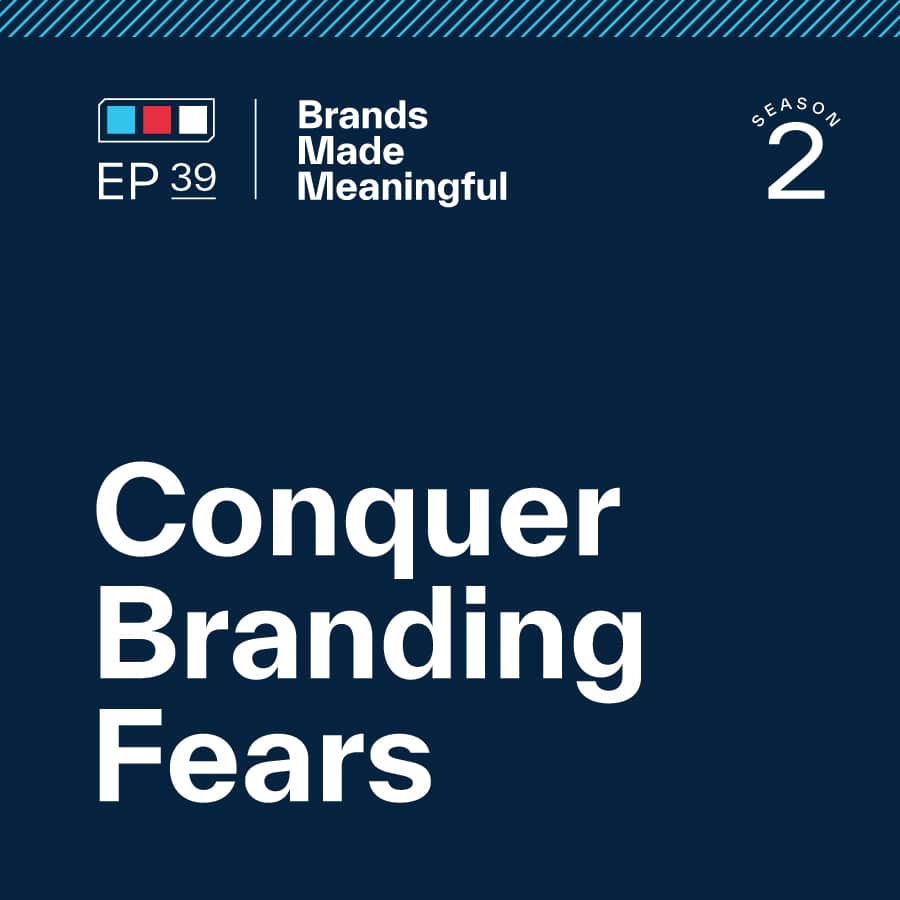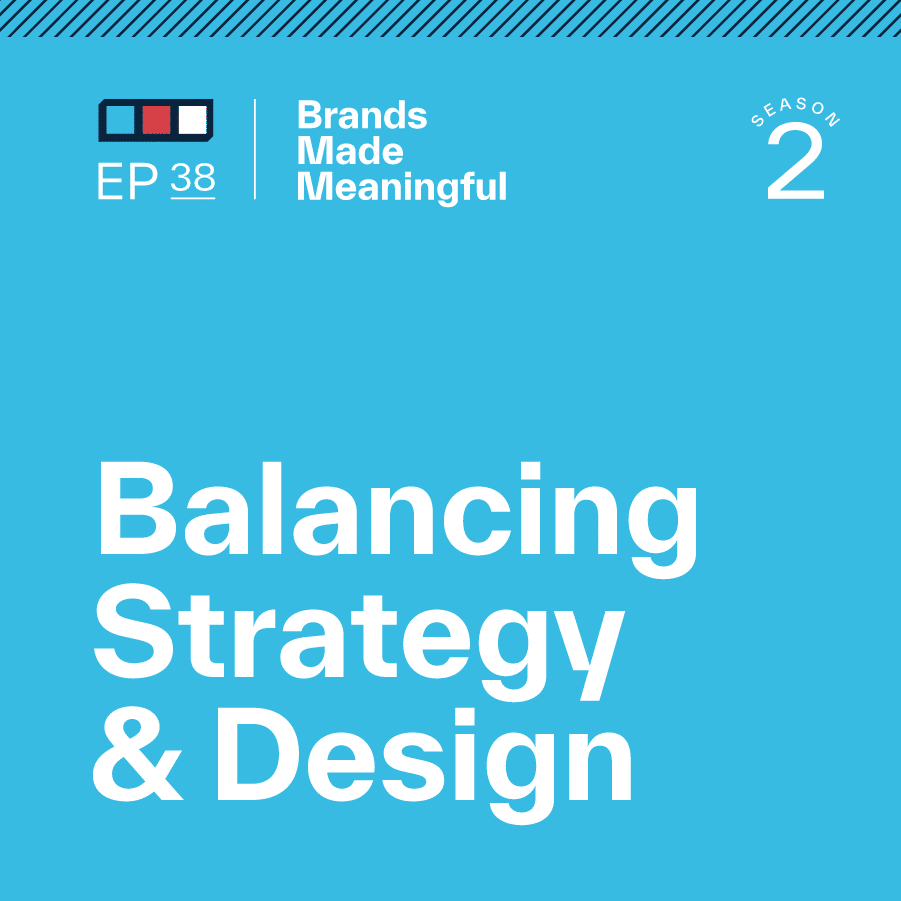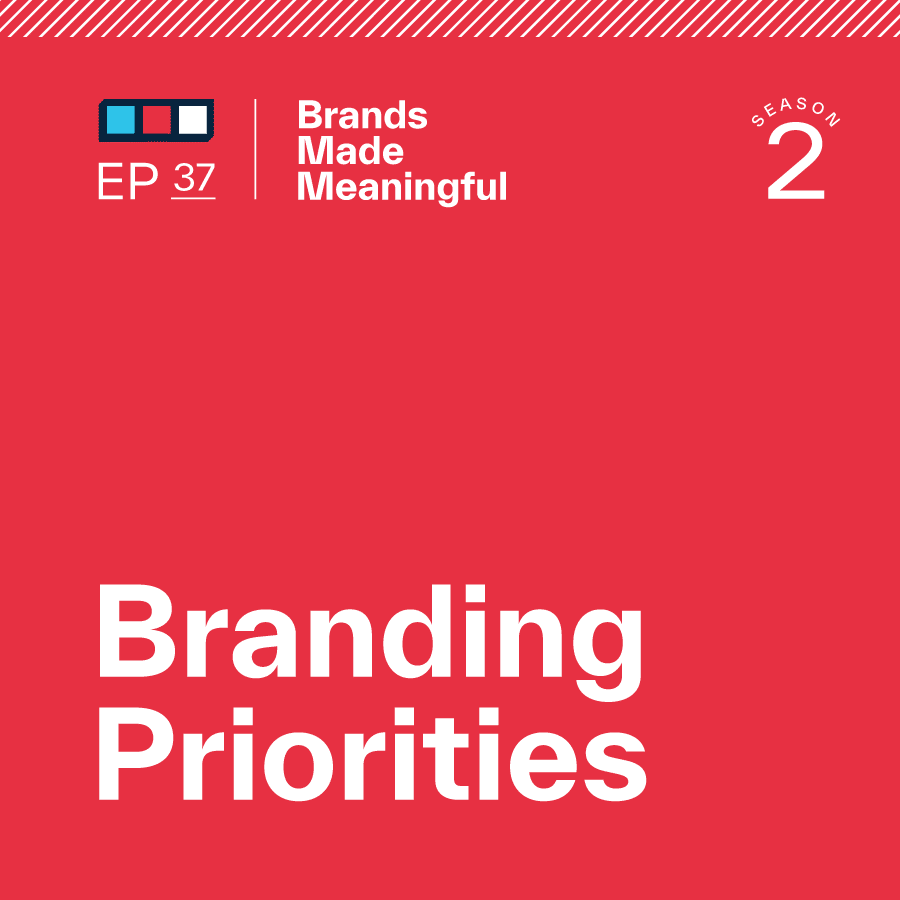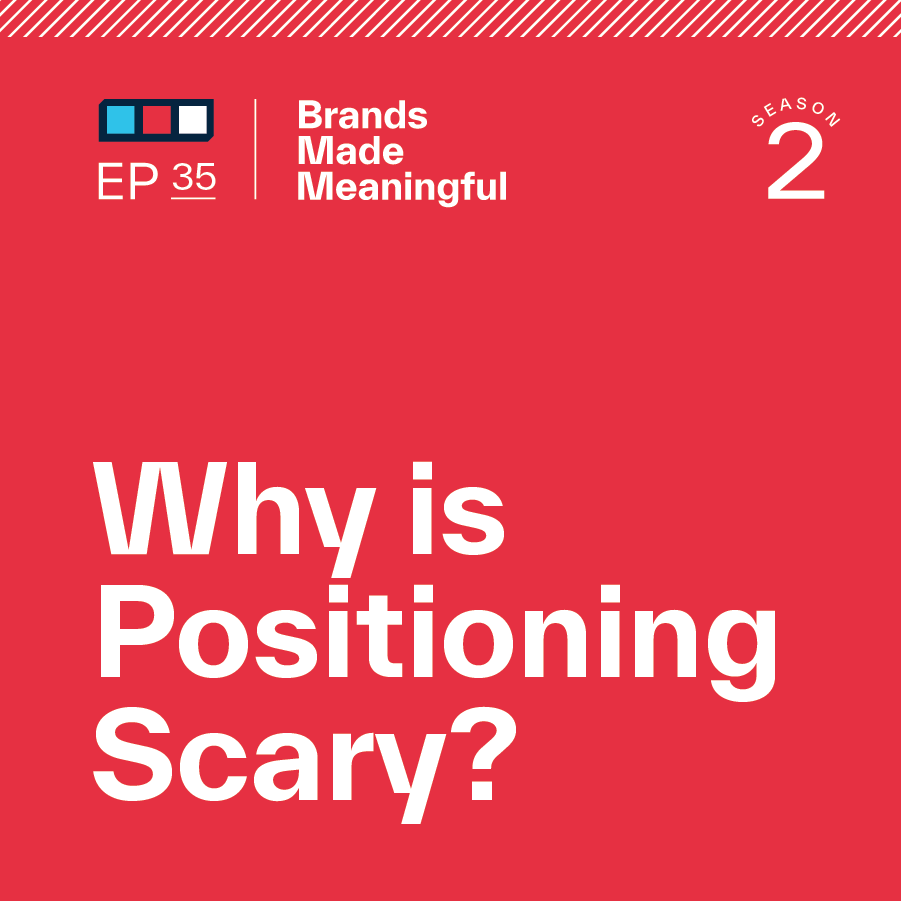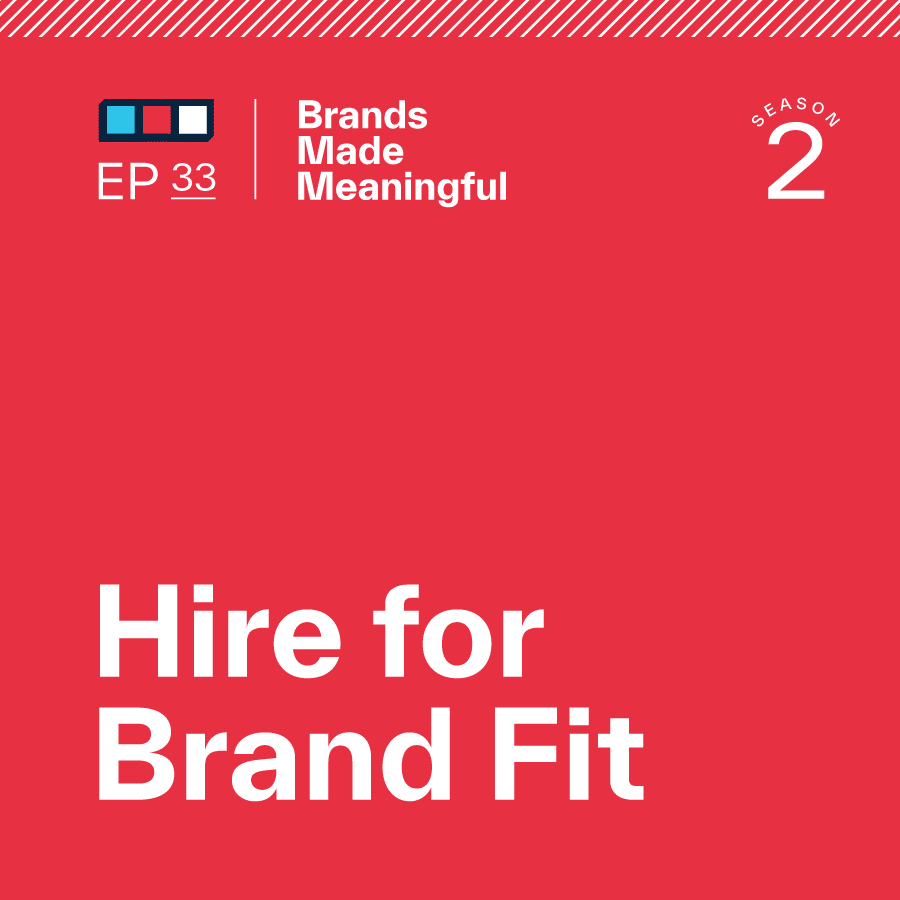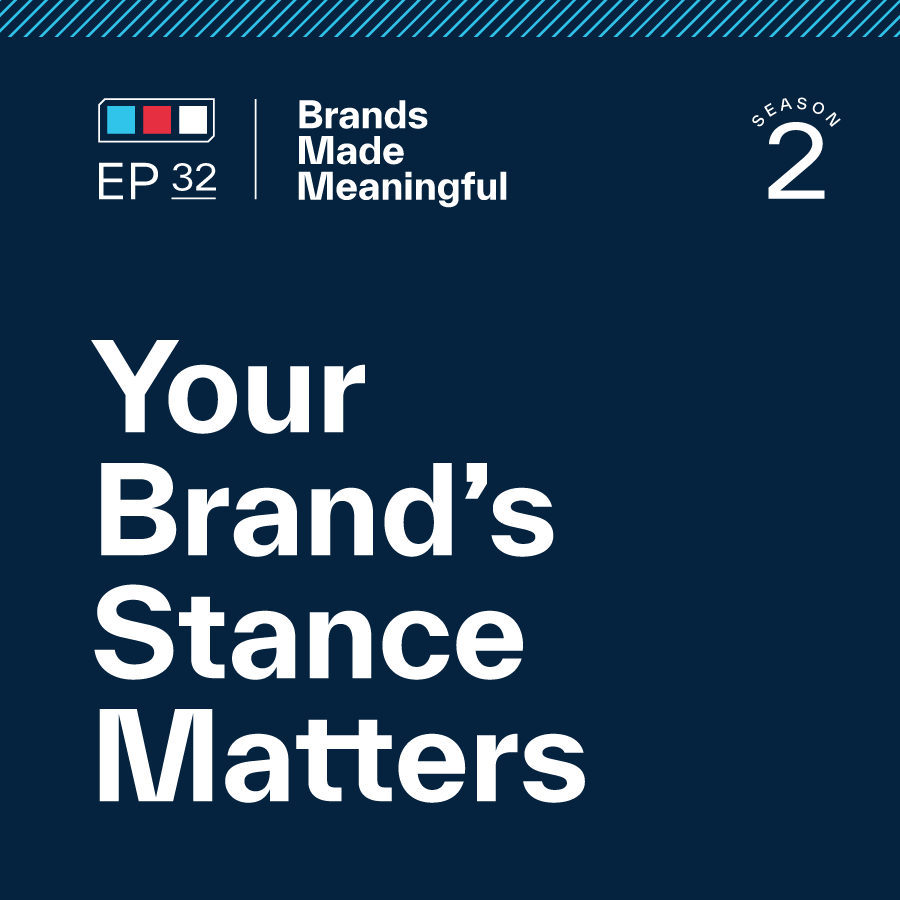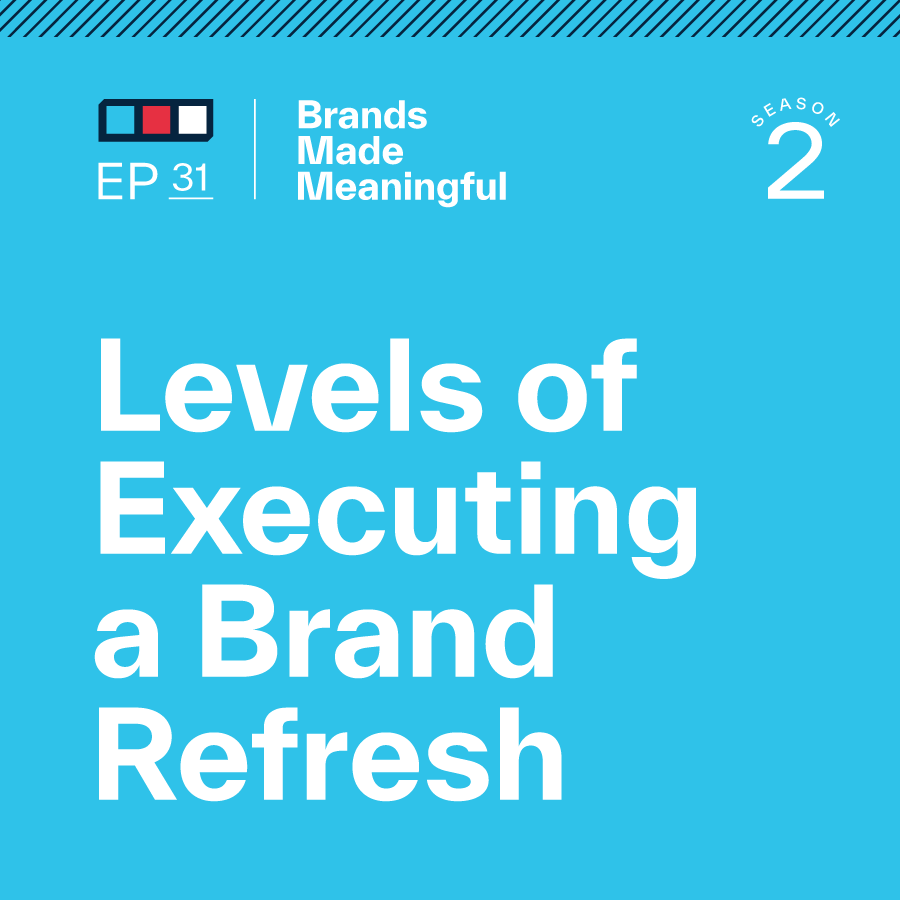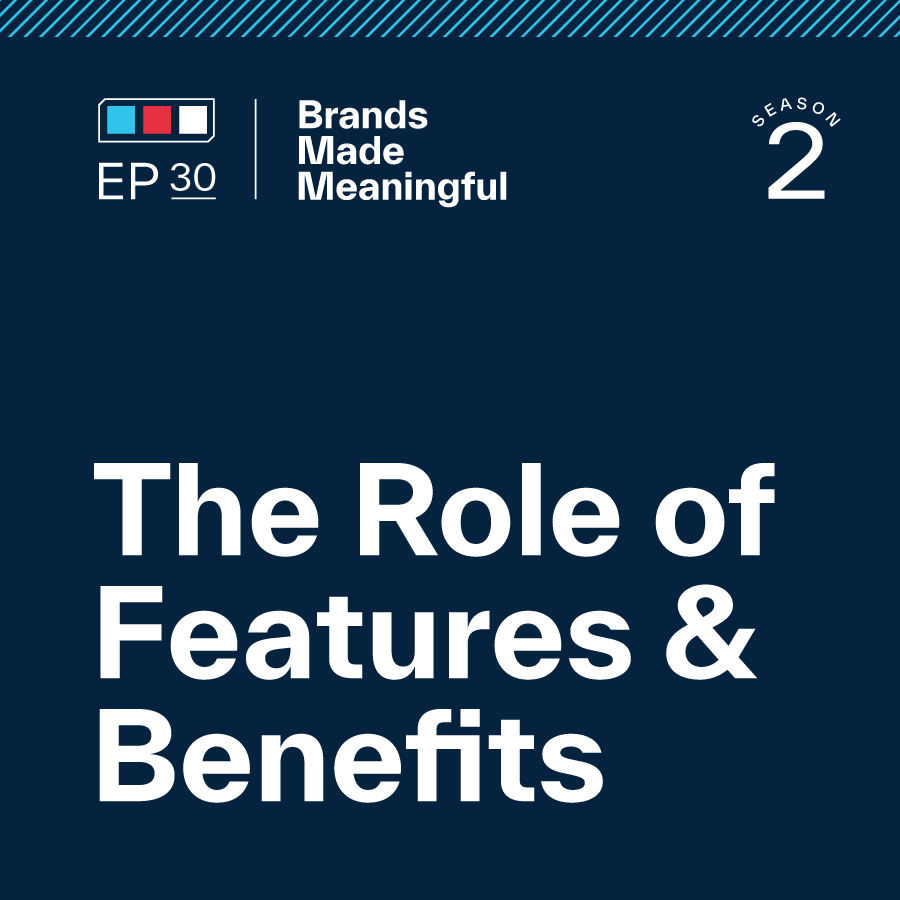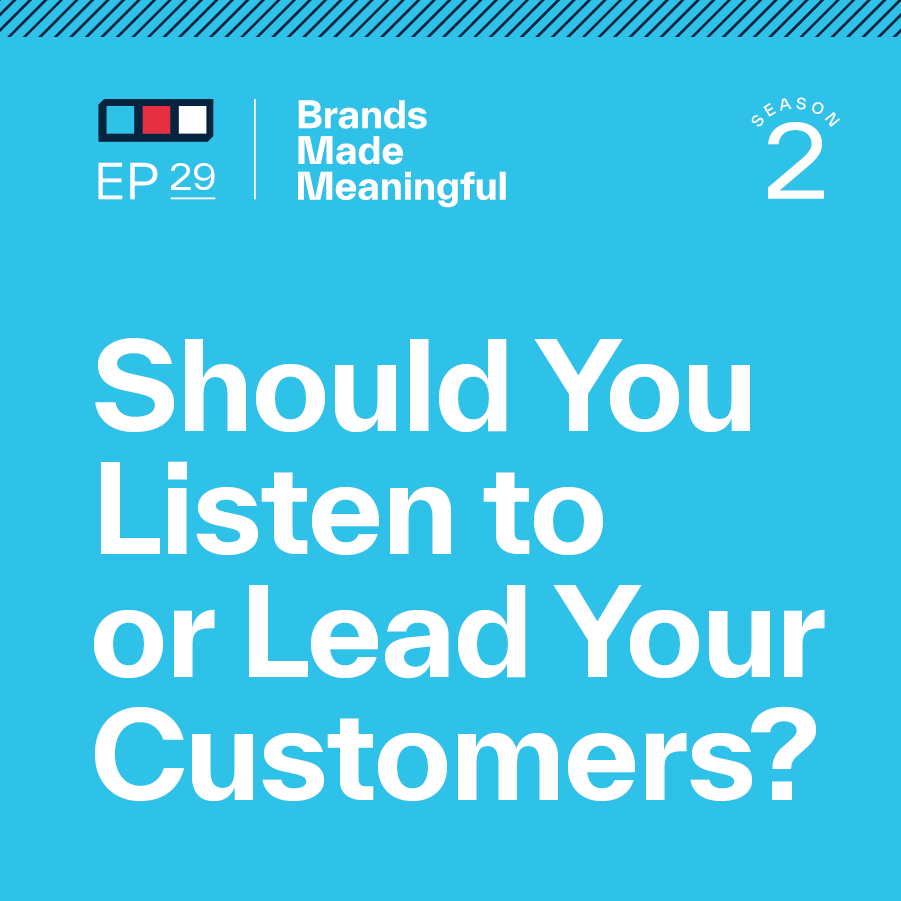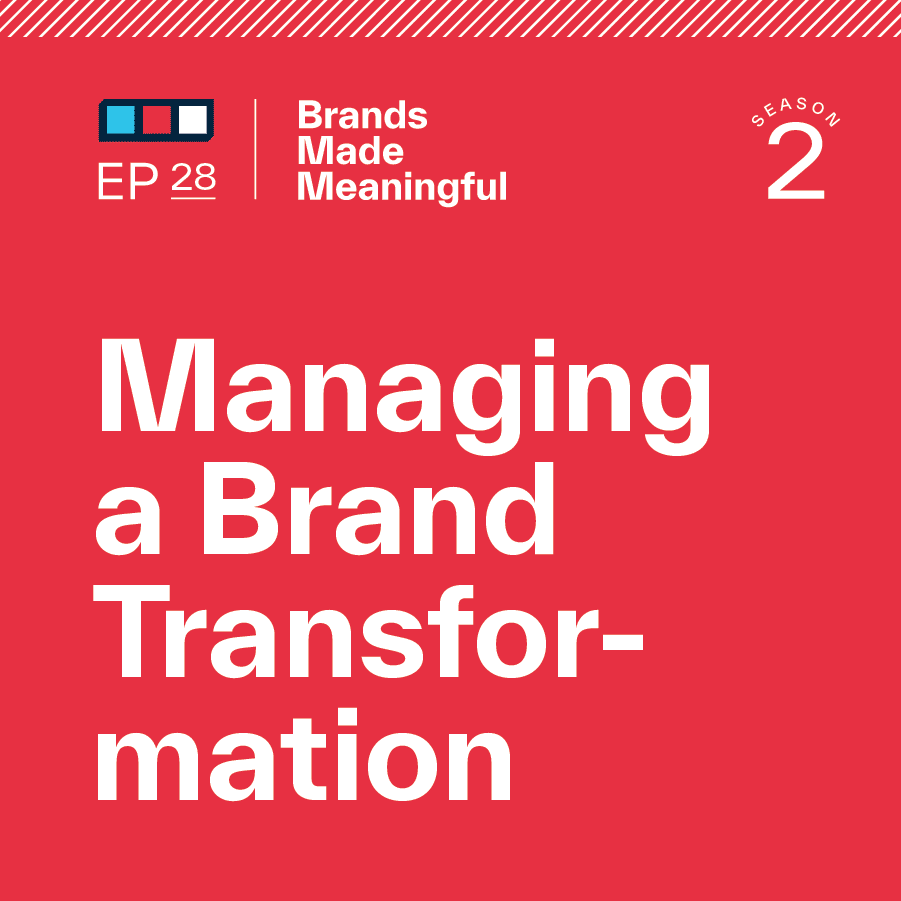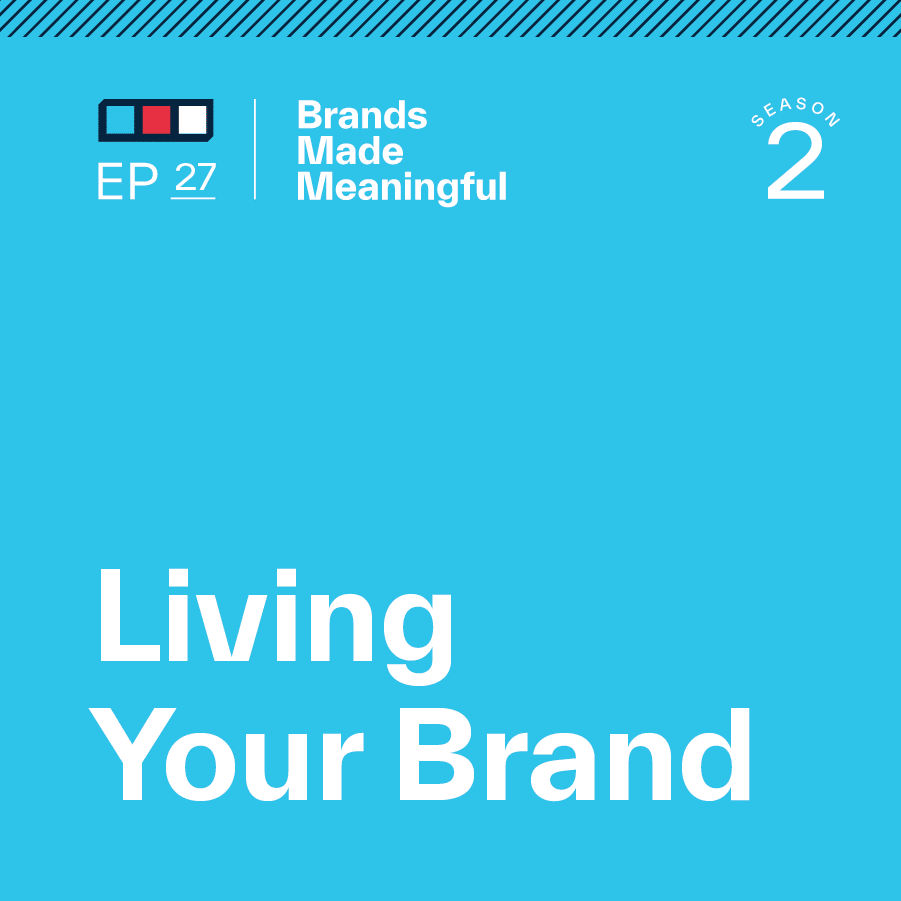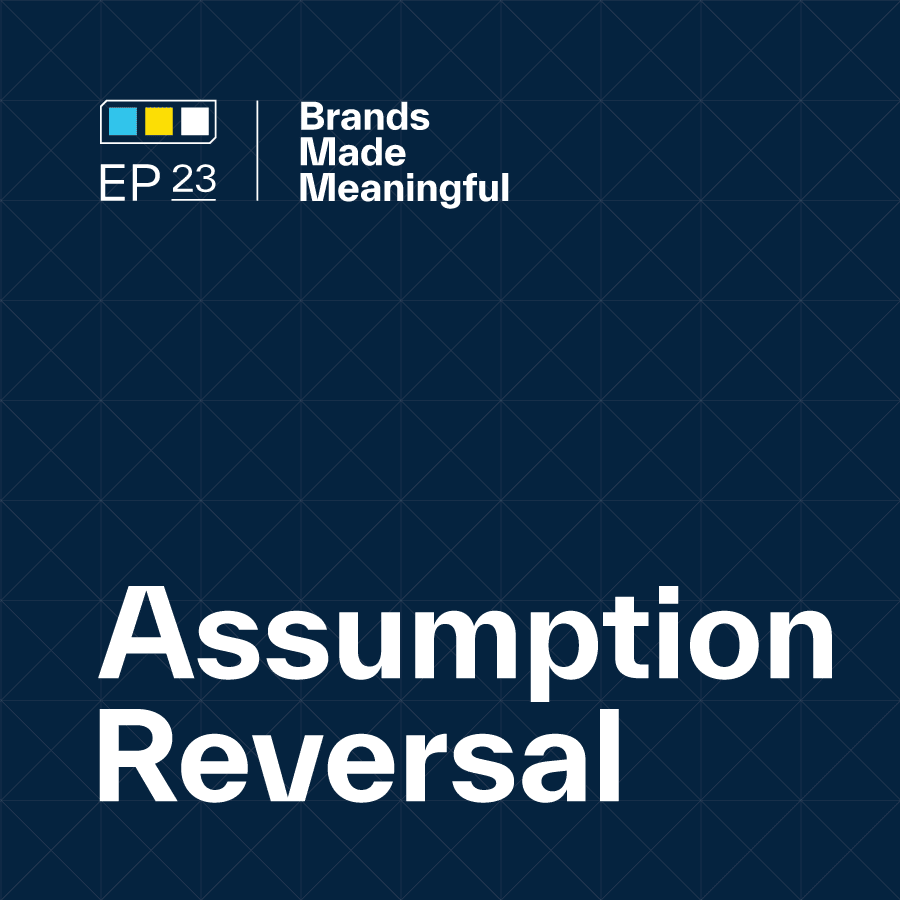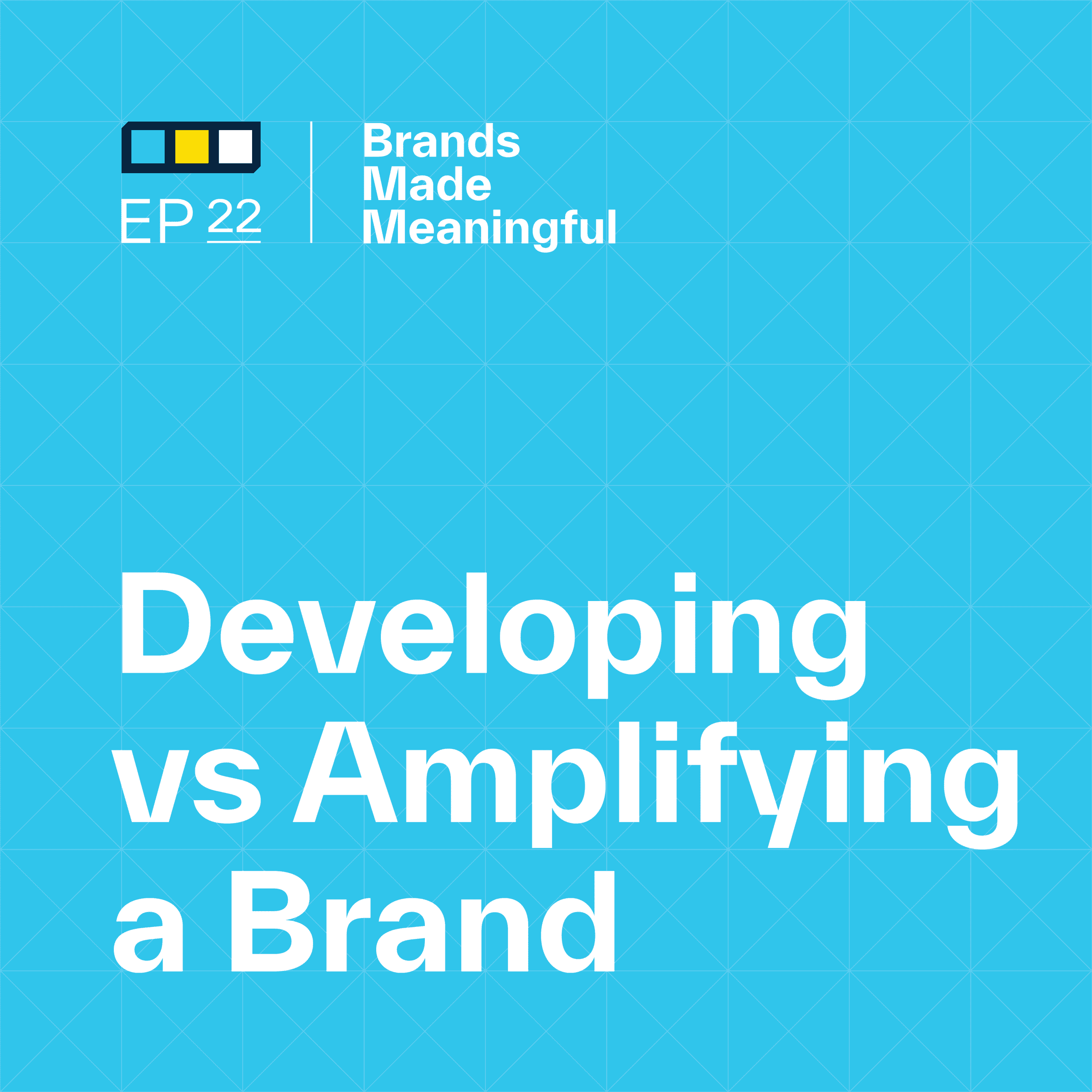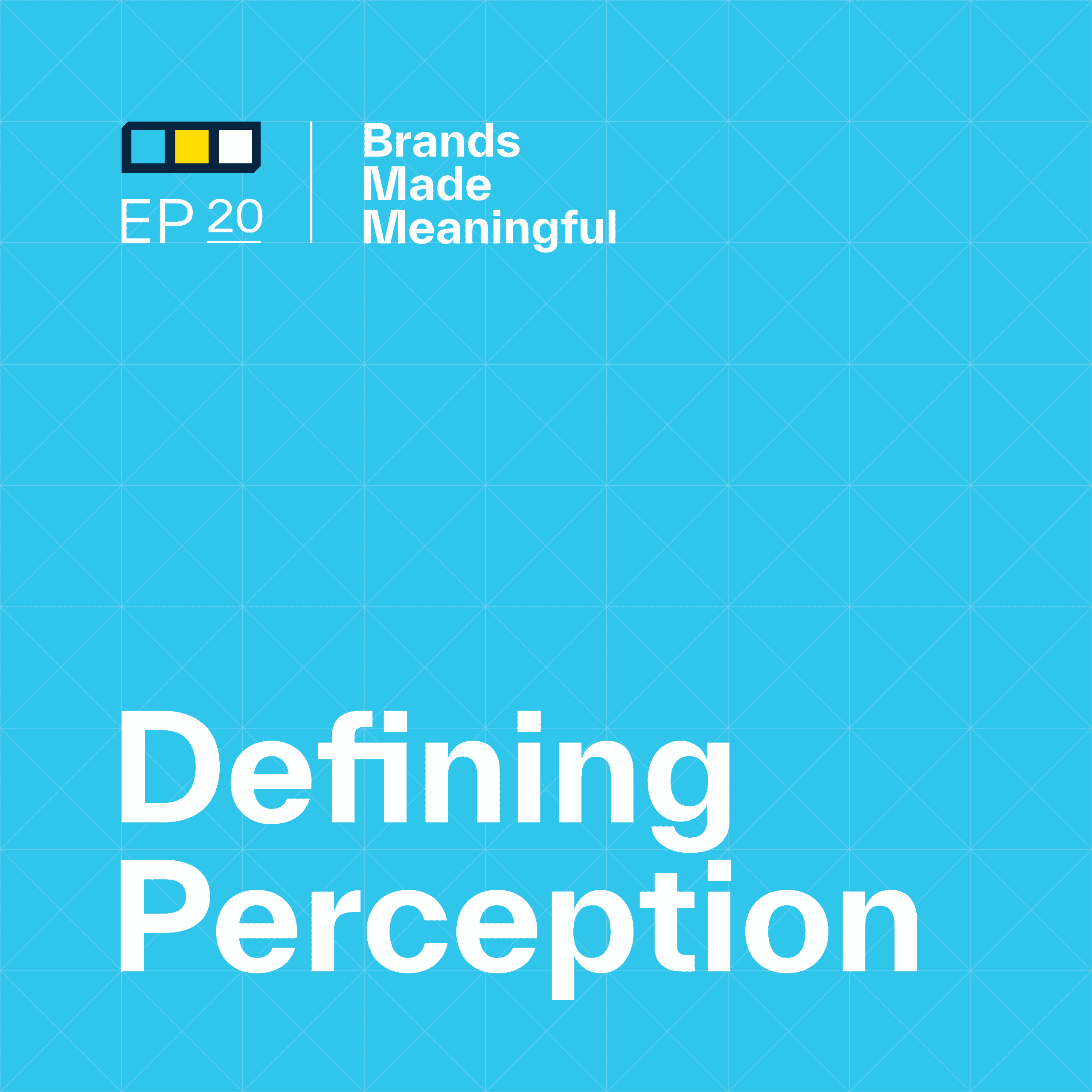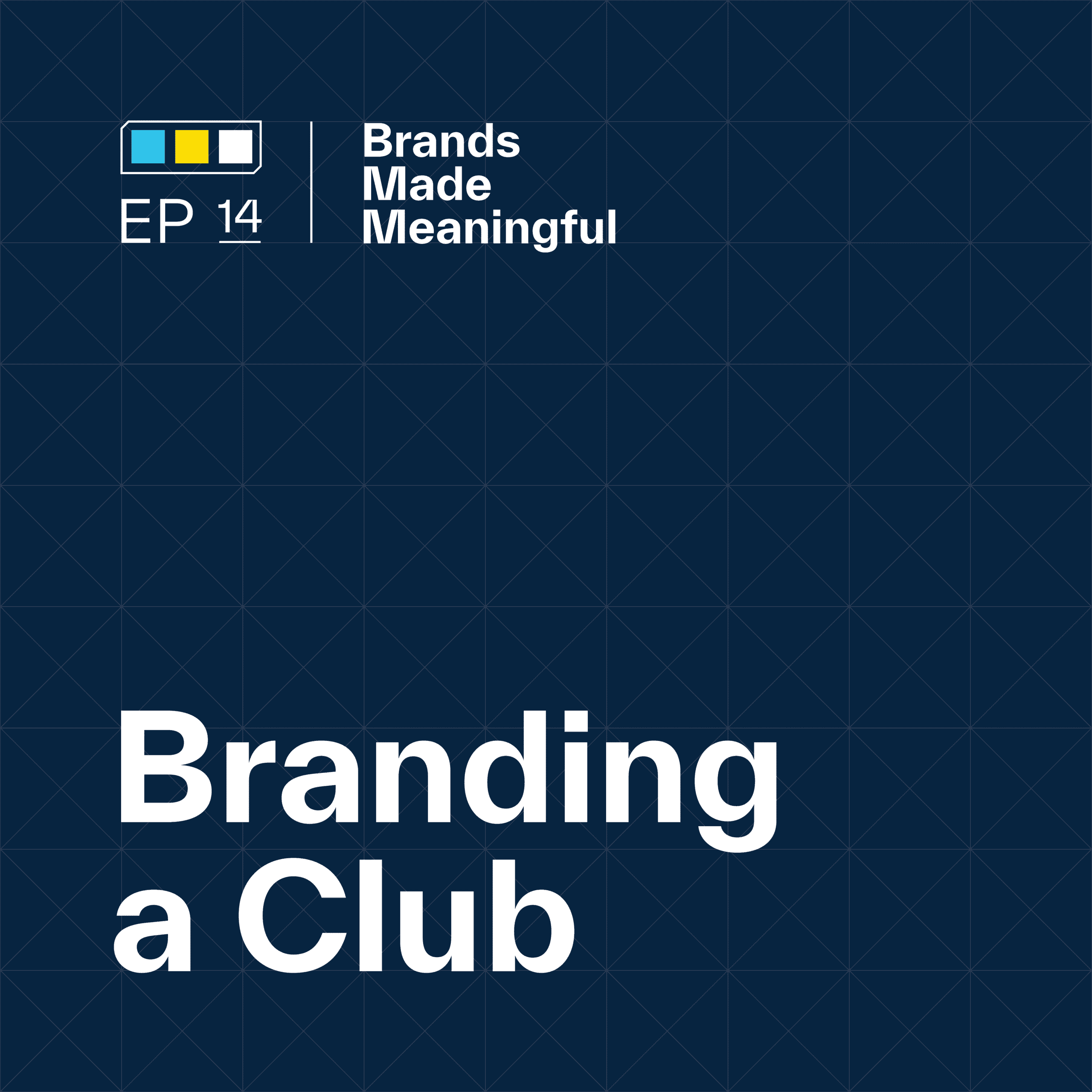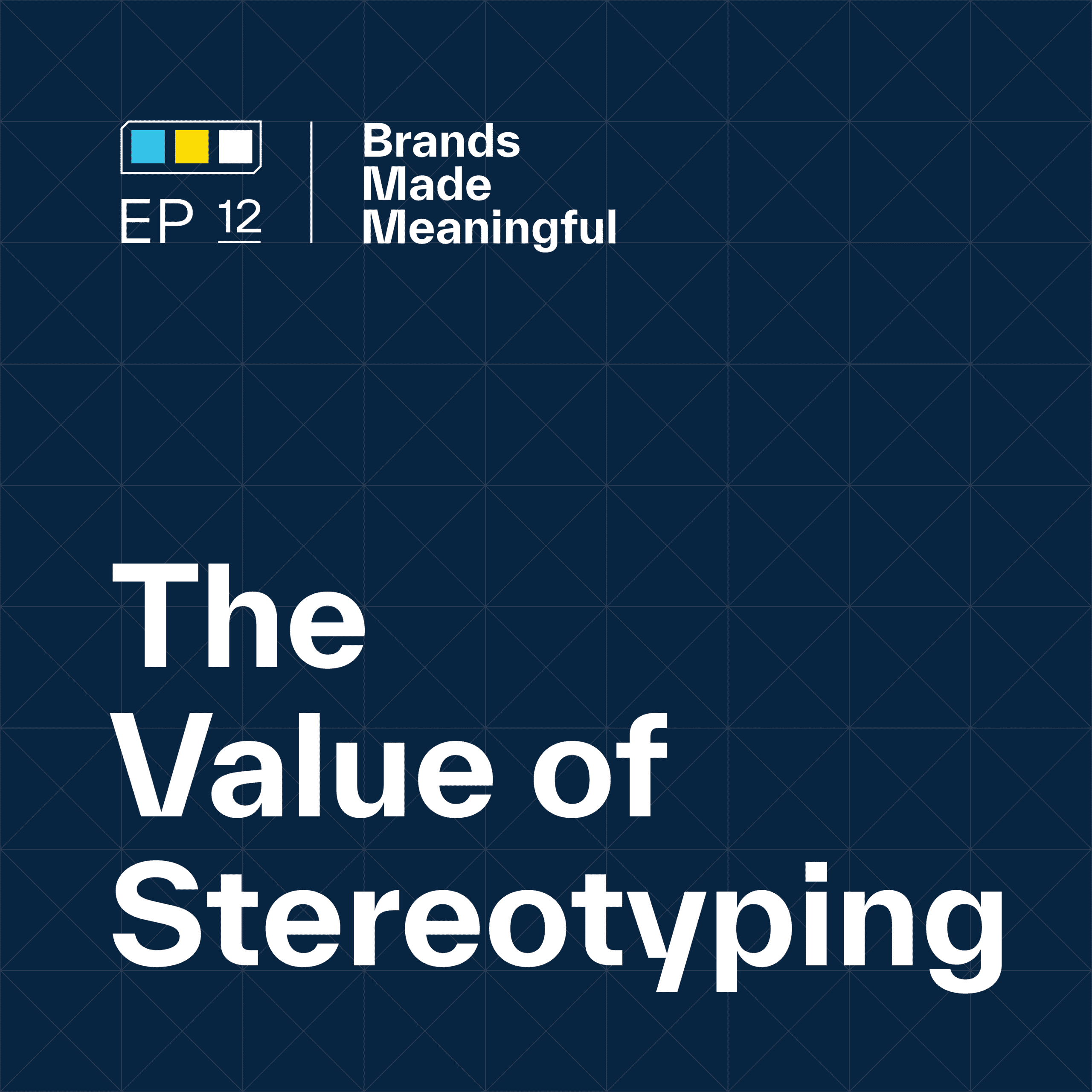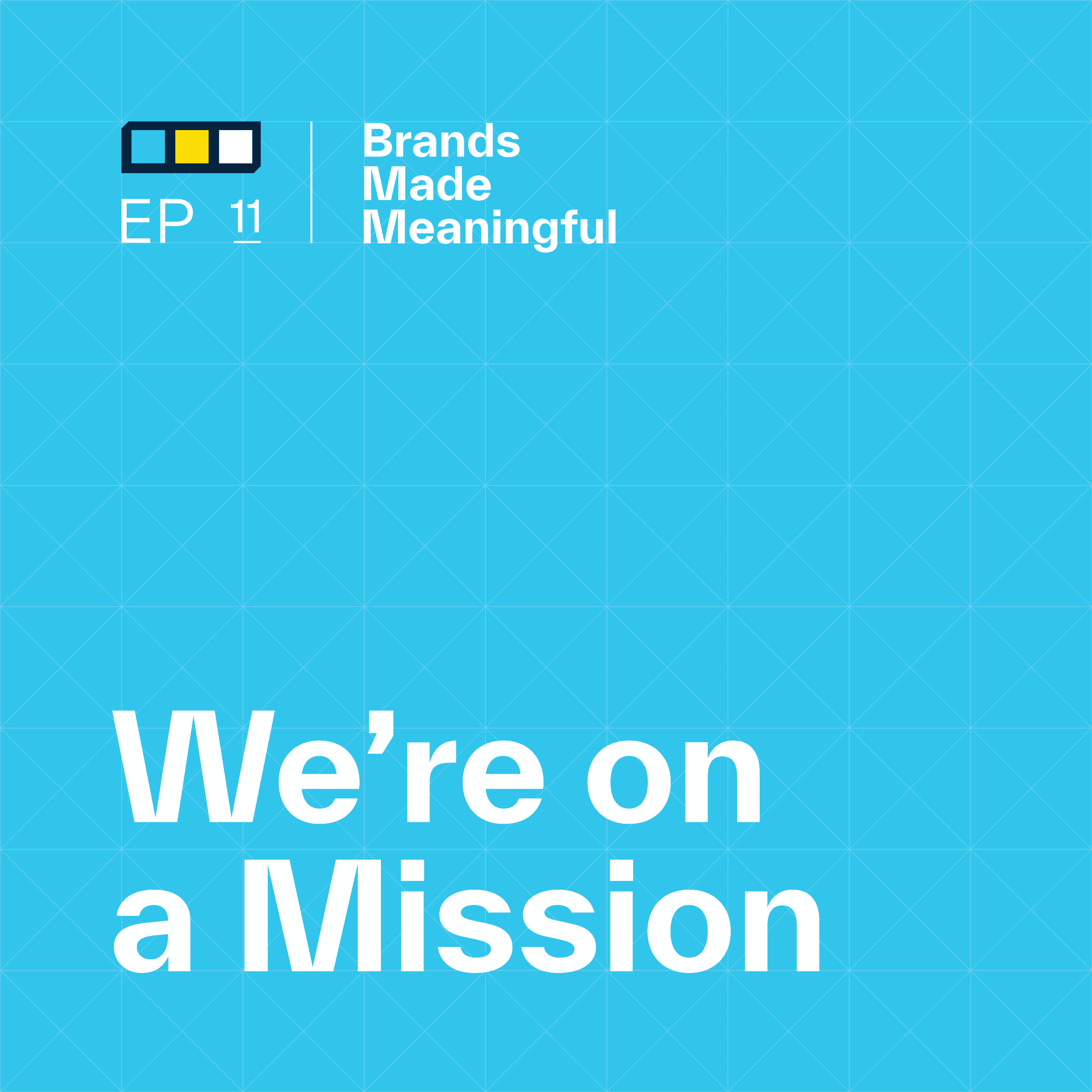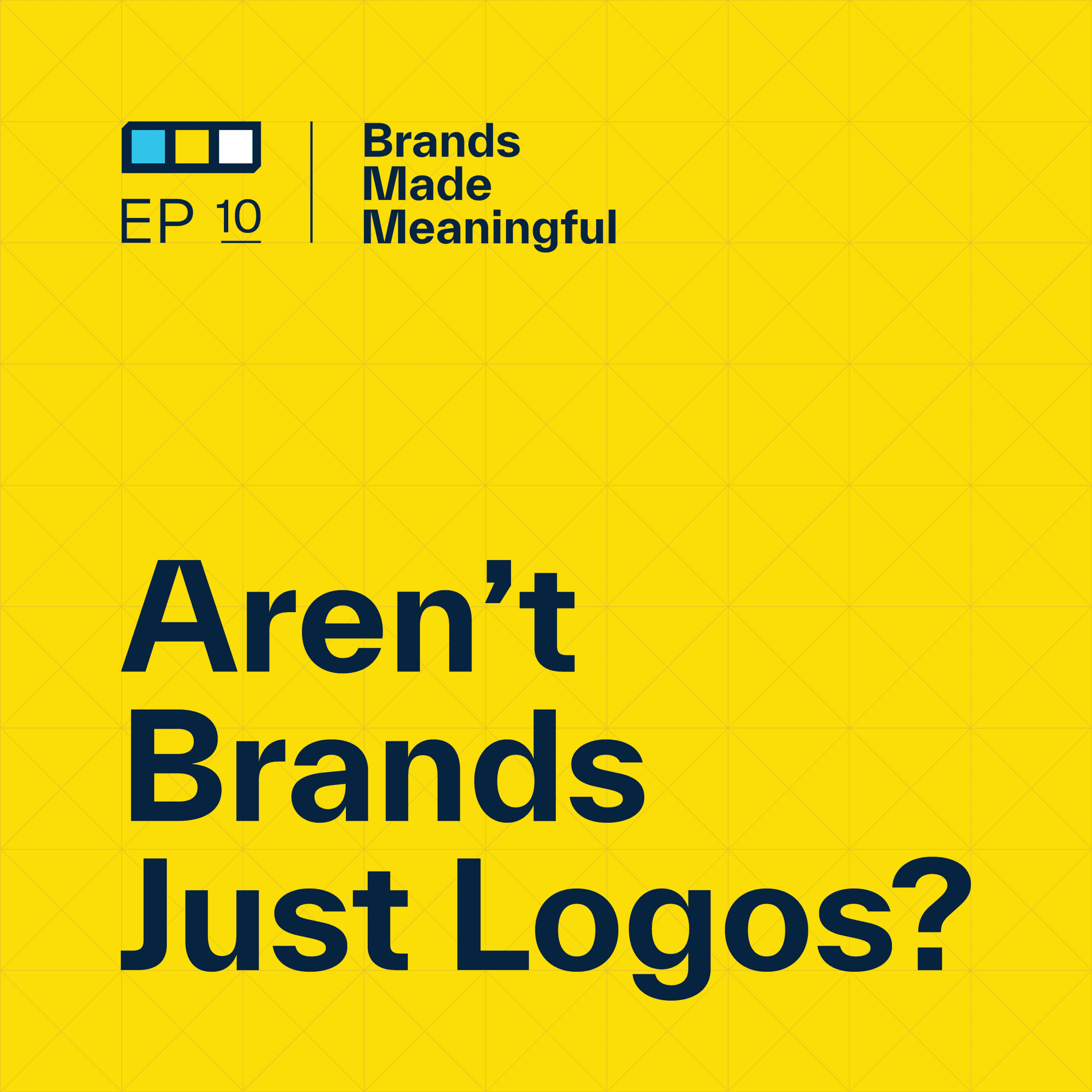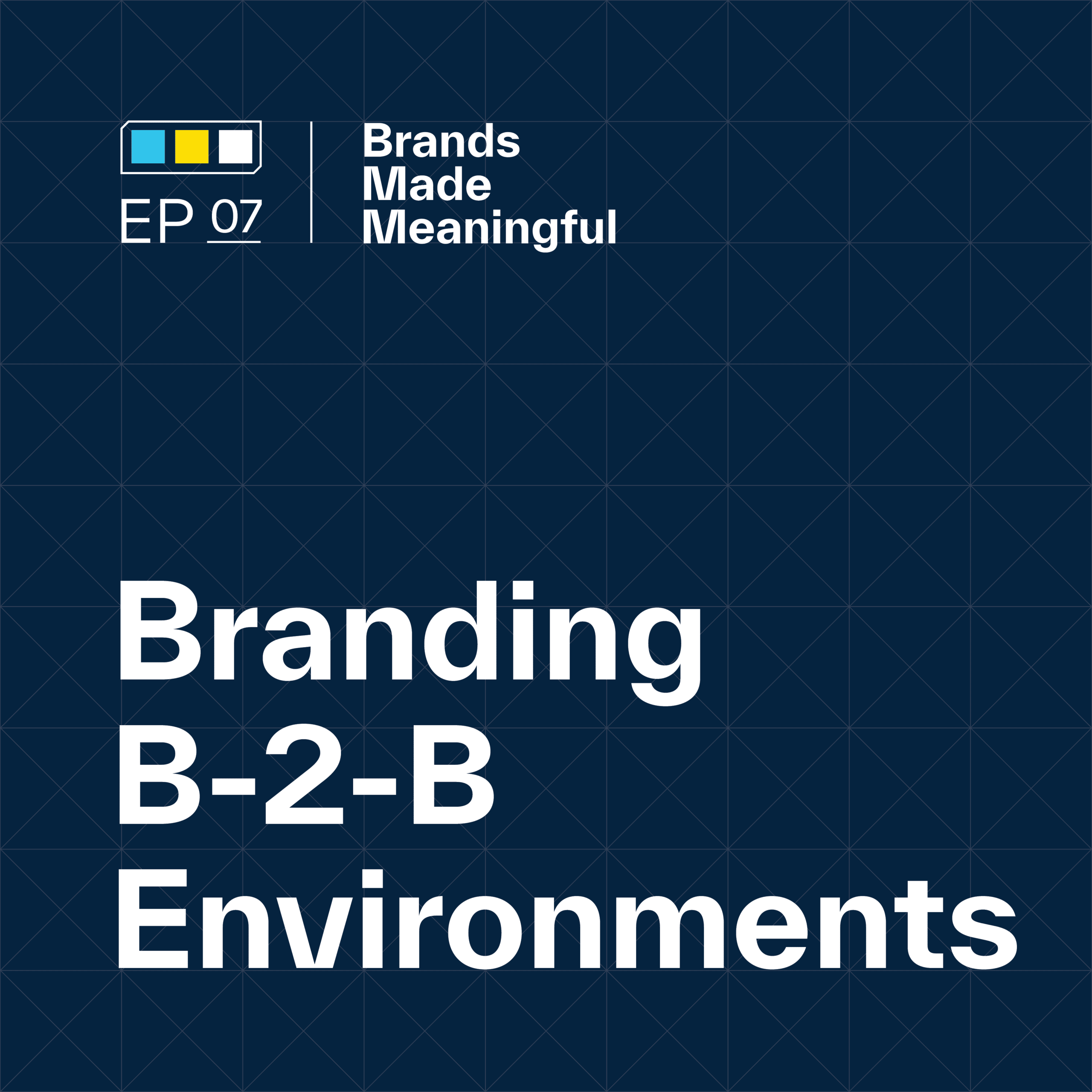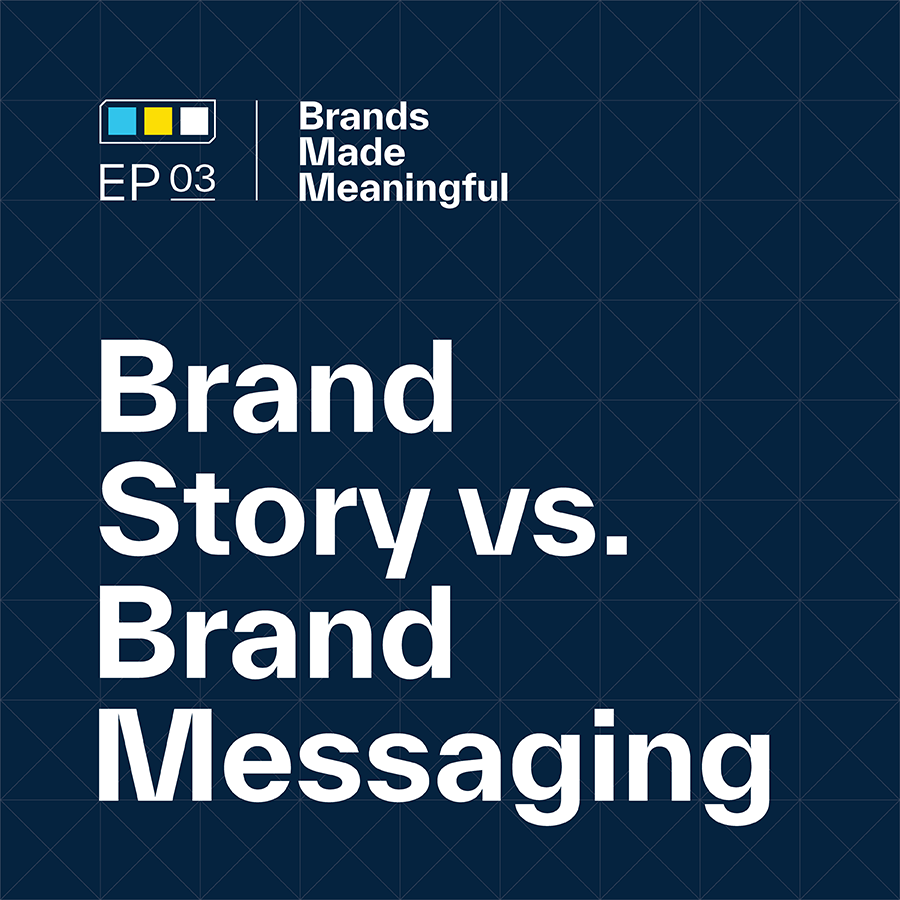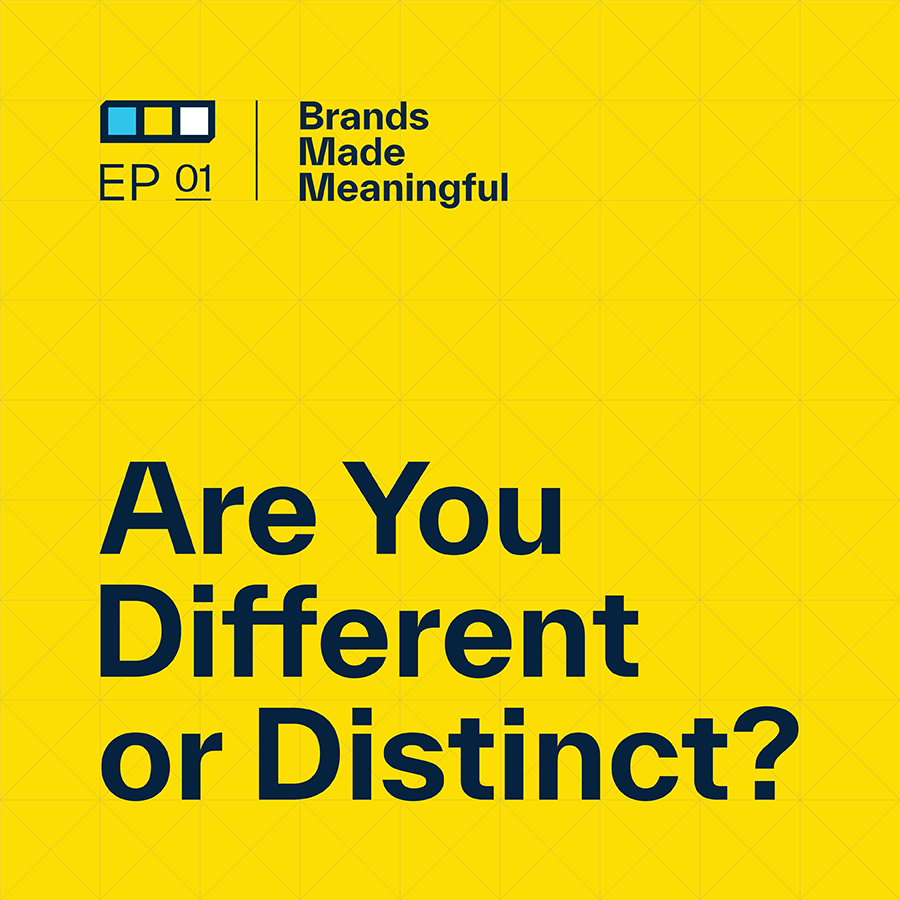EPISODE 53
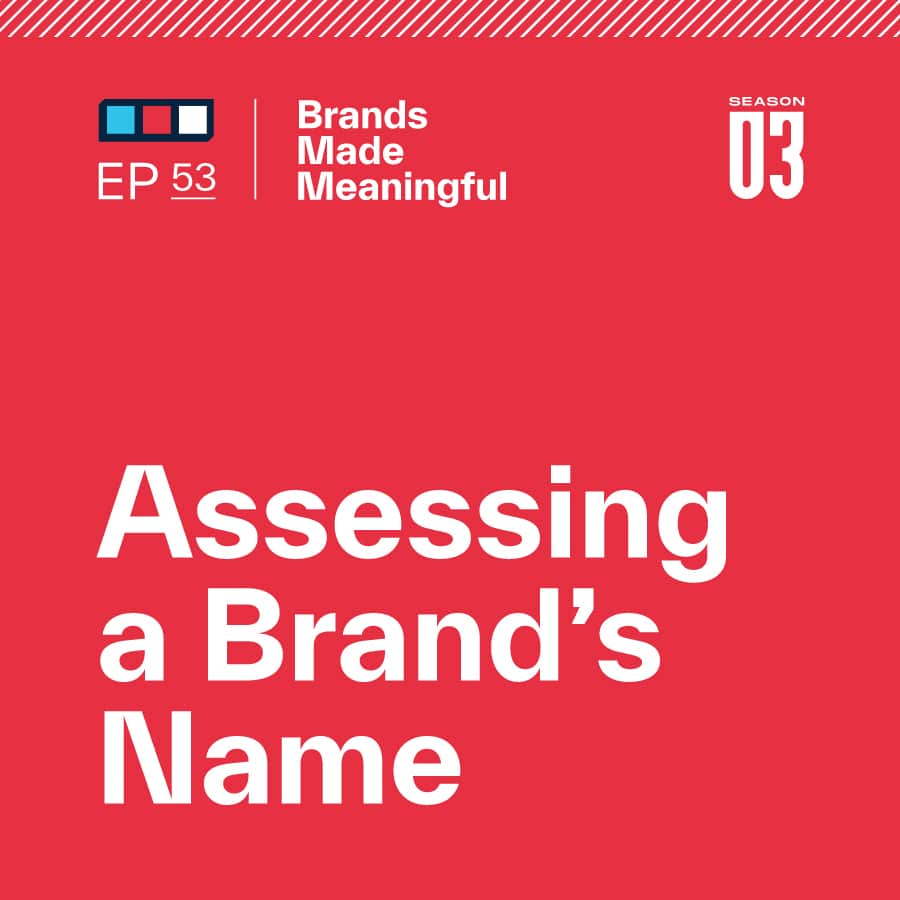
Assessing a Brand’s Name
Episode 53
Derek and Tucker discuss the intricate process of naming your brand.
EPISODE TRANSCRIPTION
What’s in a name?
Tucker I think that names go overlooked, surprisingly, when we talk about the work we’ve done within branding. People don’t think of a name like they think of a logo. Everyone thinks of, okay, we’re going to rebrand. We need to change our logo. Rarely does someone say they need to relook at the name of their brand. And that’s where this conversation really starts, saying, even if you are a 30-year or 60-year or a 100-year brand, there’s always a good time just to be at least assessing a brand name to make sure that it’s still relevant, make sure it’s still working properly.
Expand Full Transcript
Derek Welcome to Brands Made Meaningful conversations with the team at Sussner about how purposeful branding inspires unity, identity, and powerful change for growth-minded organizations.
Tucker We made it past the 50-episode mark. If you would have told me that on episode one, I would have laughed in your face.
Derek Season three coming soon.
Tucker Yeah, excited about that one. We’re going to try to push into some new territories and maybe get some other voices on here. People are sick of listening to us.
Derek Does that mean we need to change the name of the podcast? Because that’s what we’re talking about today.
Tucker Oh, what a good connection.
Derek See the segue?
Tucker What a segue.
Derek What’s in a name?
Tucker What is in a name? I think that names go overlooked, surprisingly, when we talk about the work we’ve done within branding. People don’t think of a name like they think of a logo. Everyone thinks of, okay, we’re going to rebrand. We need to change our logo. Rarely does someone say they need to relook at the name of their brand. And that’s where this conversation really starts, saying, even if you are a 30-year or 60-year or a 100-year brand, there’s always a good time just to be at least assessing a brand name to make sure that it’s still relevant, make sure it’s still working properly.
Derek People think of a name as permanent – that’s never, ever going to change. But we run into it all the time, including in our own organization, where we step back and say, Is what we’re doing and where we’re going still accurately reflected in how we talk about ourselves and in the name that we use to describe that?
Tucker And I think that if we ever do change our name, a podcast about that would be great. Just do it live. How do you change the name live?
Derek Live. Whiteboarding. Name change process.
Tucker So what I want to get into today is if you’re going to change your name, or at least look at the name. I think that a lot of people go, Well, if we look at our name, then that means we’re changing our name. That’s not always true. And so why would you look at the brand name that you have? And then in what scenarios does it make sense to say, Okay, we’re going through this type of scenario. It just makes sense for us to assess the name and make sure that it’s still doing what we want it to do. We won’t get into how to change a name. I think we had an episode way, way back about what a name-changing process looks like. And maybe we can have another conversation about that at a different time.
Derek So first and foremost, the reason you would consider changing your name, or at least looking at what your name is, is to see if it’s still relevant to what you do.
Tucker When I talk to a client about potentially changing the name, I look at two big areas. When someone asks, why would we change our name, I would say two areas are – is it still relevant/does it align with what we’re trying to do – our strategy? And then, two, what kind of market perception are we currently creating? And is it creating the right perception for us? And if we can say it’s doing both of those things really well – it’s still really relevant and on pace with who we are and what we want to be, and, two, it’s really, really good for our perception and it’s creating the right perception for us, then I would say we’re great. This is perfect. Then we’ve hit the gold standard for our name right now. We keep moving forward confidently.
Derek At a really high level, how can somebody determine whether or not the name is still relevant? Is it just gut? Is it just looking at it? What’s one tip that you would give an organization as they’re looking at their name and they’re looking at who their customers are, what their current mission statement is, what their current audience is? Is it Net Promoter Score, or is it surveying?
Tucker I would look at some kind of research, whether it’s consumer research or internal research, to ask the question, what kind of perception do we want to create? Or maybe we’ve already defined it. Define that with everybody and say, Here’s the perception we’re trying to create. And then asking people if our brand name creates that perception for us is a really easy way to start. There’s a lot of things you can do. And, like I said, I don’t want to get way into the weeds of how you do all of that. But if you start asking questions – I call it socializing the problem. Let’s just go around the organization and start having the conversation. Do you think our name does what we’re trying to accomplish within the market, within our brand? You might get people pushing back and being like, Wow, you’re crazy. But you just go, Hold on a second. Let’s just have a conversation from an objective point of view. And I think the objective part is very, very important with this. There are a lot of people who may have worked at an organization for a long time or have been a part of a club for a long time. They are attached to that name. It’s going to be really hard for them to move off of that name. If you came to the office and said, Hey, I want to change the name of the company, I’m sure that at least half of us would be like, What are you talking about? That’s crazy. And so when you talk to people, let’s live in a place of removing ourselves from the amount of work that goes into it and just say, Is this objectively helping us be where we want to be? So that’s where I’d start. Either have conversations or if you do end-of-the-year surveying of a membership, or maybe you do end-of-the-year surveying of your fan base, or maybe you do end-of-the-year surveying of your consumer base, just kind of slide the name question in there. Some organizations might think that’s crazy because people are going to start asking questions about it. You know your audience better than I do right now. So that’s where I’d start.
Derek Perfect. So relevance and alignment and market perception. There are a handful of events we’ve kind of queued up here that would trigger assessing whether or not your name still is relevant for who you are, what you do, and where you’re going.
Tucker These are scenarios that have come up over the last five years when I go back and say that name change really would have made sense there, or they did a name change and it made a ton of sense because they were going through this type of process. Just try to list them all out and say if you’re going through one of these scenarios, just have the thought that maybe your name might need to be looked at. It’s just like a website or a logo. If you would say, let’s look at that every couple of years, these are the things that I would say trigger that looking. And I think you just run through these.
Derek Yeah, but you look at these first, then you decide. Sometimes we work with an organization and they’ll actually ask us right up front, We’re thinking that maybe the name change should be part of this. And our answer is usually, I don’t know yet. Let’s first understand what these different triggers might be and what these factors are. And then we can make a better recommendation.
Tucker I think that what we’re going to come back with is there’s never a perfect time to change your name. What is the saying? There’s never a great time to have a baby or something like that. There’s never a great time to change your name. There’s going to be a million reasons not to do it. However, some times are better than others, and I would say that a name change doesn’t completely change the game for you. So I wouldn’t do it as its own event. I would tie it into something that’s a larger signal of a change.
Derek There’s a restaurant that used to be by my house that was failing, so the owner changed the name. They rebranded it – a new name, new logo, same staff, same menu, same interior, same food.
Tucker Vibe. Yeah.
Derek And it ultimately went out of business. So they weren’t effectively changing anything other than just the sign on the outside.
Tucker I don’t like to think of name changes as marketing plays. That can be the perception of it a lot of times, saying, Oh, you changed your name for marketing purposes. Like you just established, there’s a lot of, Oh, that’s interesting. There’s a new name. And then you go there and it’s just the same thing. It almost makes you feel worse about it than you did the first time.
Derek Super disappointing.
Tucker Not a great way to go about it. But anyway, going back to these scenarios, I just want to walk through them and then we can talk about them a little bit. So the first one is you’re doing a strategic shift. Think about things like you’re changing markets or you’re expanding into different areas. Maybe you’re re-diversifying your products or your offerings saying, Okay, I’m looking at what we offer and we’re going to change that in some capacity. Or we’re going to expand that. Basically, we’re trying to redefine ourselves in either this industry or we’re going to define ourselves in a new industry.
Derek You’re either going away from something or towards something usually.
Tucker The next one is mergers or acquisitions. This happens a lot when a client would come to us and say, We just merged two, three, four, eight organizations. What should we do with naming? Should we take one that we currently have? Should we build a brand new one? What is the way to go about that? Some people just take the biggest name and keep moving forward. And that can be a good option. That can also be an option that hurts things like culture and that hurts things like the perception of the company where it rallies underneath the perception of the largest one, which can not always be the right way to go about it.
Derek We’re working with an organization right now with that exact issue where three organizations merged. They took the logo from one of the organizations and combined it with the name of one of the other organizations. I don’t have clarity on why they picked which for each other than it was a concession by the owners coming together and saying, Give and take, let’s keep our logo and keep your name.
Tucker Which at the moment seems like a good idea. I think that there are a lot of logistical ways to look at a name and say that it makes a lot of sense. But the way that I would look at it, away from the financial burden that changing a name comes into, is it helping us be who we want to be moving forward? And for mergers and acquisitions, that’s a hard conversation because there’s a lot of politics, internal politics, that go into that specifically.
Derek This organization in particular continues to struggle with referring to the name of the organization that they used to work for. So I’m actually Legacy Acme Company, even though now I work for this organization.
Tucker I would never work for Acme Company.
Derek What does Acme stand for?
Tucker I have no idea.
Derek The next one. Global expansion.
Tucker Global expansion. We work with organizations that may have started in a specific country, and they get large and they have a lot of success, and that’s awesome. But when you move into a new market, especially into international markets, your name might mean something else in a different language. That is not good. That can really hinder your growth and your ability to sell and have success in those markets. I think there are a lot of people that might expand into a market and for a good reason but they overlook the ability to say their brand doesn’t mean the same thing in that culture as it does here. So when you’re going into this international market space, you should be looking for that. All of the different ways that your current brand is perceived here might not be the same way there, especially when you talk about the name. It could mean something in a different language or it could have a different slang version. Working with companies, even when they come from other countries to the US, it’s the same way. Your name is very, very popular in your original country, but when you come here, it doesn’t really mean the same thing. It doesn’t have that same level of perception.
Derek The next one is to differentiate. It’s literally to help you stand out from your competition.
Tucker I talk about this in the matter of how the competitive landscape has changed. And you’ve noticed that there are more competitors in your industry, or maybe there are different competitors in your industry than there were when the name happened, whether that was 30 years ago or whatever. This means that you should relook at that to say, Okay, we’re looking at our competitors, we’re doing all these other things. Maybe a competitor has a very similar name to you. Maybe they’re all named in a certain way, and you’re named in a different way. To start being mindful of that at least allows you to be objective saying, Okay, things are changing in our industry. How do we change or not change?
Derek I’m going to pick on the industries, but the legal law firms and accounting firms traditionally string a handful of owners’ or principals’ names together. One really easy way to stand out and differentiate from that very normal nomenclature is to name your law firm or CPA firm a name that’s not three people’s names.
Tucker Private clubs are the exact same way. They’re going to pick the name of the most popular tree on their course, and then they’re going to match it with the landscape that’s around there – like Pine Valley.
Derek Or they’re going to name it after the nearest city in which they live, even though it isn’t a municipal golf course and has no affiliation with the actual zip code that it shares. It’s just location.
Tucker It’s just easy. It’s like, Yep, let’s do that. Sounds good. The next one is a brand evolution. Maybe you’re going through some kind of brand evolution. Maybe you’re saying you need to relook at your brand. You need to refresh it. That’s a really great time to look at the name. You’re already doing the brand-forward work. It’s just adding that onto the docket to say you don’t need to change your name but you do need to assess your name. Just like you would assess your brand. For any client that comes to us with a rebranding or a brand evolution initiative, we always say the first step in our discovery and strategy process is assessing the current brand and saying if what we look like and feel like and sound like is doing what we want it to do in the broader marketplace. And that’s an awesome time. Especially when you’re rolling out new logos and new colors and with all the graphics and the verbal changes, to say, And by the way, we’re going to be called this from now on.
Derek This is the one, of all of these, that is probably the most in our wheelhouse. It’s the one that we see the most because brand evolution and rebrand type of work are the backbone of what we do. But this comes up all the time. Earlier today we had a conversation with a golf club that we’re working with on whether or not the name should change. And so we’ve done some surveying and we’ve made our recommendation. We’ll see what the board decides. But it takes a lot of weighing in to say this is a 110-year-old golf club that has turned over 70% of its membership in the last seven years, and it’s completely redefined or refined who its target members are. Does the name that we currently call ourselves reflect the ten-year, 20-year vision of where we’re going next? And it’s a really interesting conversation because emotions come into play. People are sentimental.
Tucker History comes into play.
Derek We’ve had the same name for 110 years. How dare we change our name? It’s a complicated issue. But evolving the brand, which is what they are doing, for a lot of forward-thinking reasons, whether they change it or not, this is at least a good time to consider it.
Tucker The next one is a milestone. When you run into a milestone as an organization, it’s an awesome time to rethink some of this stuff, to say, Okay, we’re reaching our 100th anniversary. On the same note, we just talked to another private club a couple of weeks ago where they said, We’re getting close to 100 years. Is it time for us to relook at how we name ourselves, what we establish ourselves as, and is it relevant moving forward just because we’ve been here for 100 years? That was a super visionary conversation from the club to say, Hey, we’ve been this. But that doesn’t necessarily mean we always have to be this. But that next era in this organization’s life is going to be who cares what we were? Let’s figure out what we want to be and let’s move forward. So these milestones are a great time to say we’ve done this for a long time. Is it still right?
Derek So our organization’s turning 25 this year. Does that mean we need to change our name?
Tucker Oh, I didn’t even think about that. Wow. Yes, it does by the way. There are more scenarios than this. I think it’d be naive for me to say that this is it. This is all you get. There’s a lot of times where it goes, we’re changing. We should look at our name just to make sure that it’s right. But overall, I think the takeaway from this is to think about your name as another asset within your brand. It’s not the whole thing. It’s like the logo, right? The logo is an asset. We’re going to use it as a tool. We’re going to craft perception with it. Your name is the exact same way. I think of your name as the verbal logo for your whole brand, and the logo is the visual component of that. If you say this is what people say to each other, this is how they bring us up in conversation, it touches so much of how our perception is. If it doesn’t help you create the right perception, then that can be a huge miss from your team.
Derek What we talked about earlier is being able to evaluate whether or not it’s creating the right perception and doing so as objectively as possible is the way to do it. It’s so easy to get lost in the subjectivity, the sentimentality, it’s the way-we’ve-always-been type of approach, and it’s easier to stay with what you have. Changing your name takes some bravery. I don’t take that lightly. Changing the name of your organization, unless you’re a couple of months old and your name has no equity in the market, takes some guts. And so it has to weigh out the pros and the cons and the investment and the hard costs and expenses that will come with changing your name and changing URLs and communication materials, etc.
Tucker Absolutely. Signage, legal things, legal documents. There’s a lot of stuff in there. And I think that when we talk about changing the name, people go right to the big question of, Okay, we’re going to change the entire name. Maybe not. Maybe you change a little bit of it, or maybe there are multiple components of it that we change, or maybe we’re blank and blank this company and maybe we want to be switched a little bit from that. It’s not necessarily an impossible task. There’s a lot of ways around it. I would agree that it takes bravery. There are a lot of people who would say, We’re going to change our name. And everyone in the room would be like, Whoa, are you serious? There’s a little bit of stigma around that.
Derek I would think of a pros and cons list of saying, is our current name getting in the way of us growing our business? Is it neutral or is it actively helping us in our business?
Tucker That’s a great way of looking at it. If I try to remember all of the projects where we’ve at least talked about name, which is a lot more than you would think, less than 50% of them actually change their name. More than half look at the name and then go, No, it’s either doing what we need it to do or it’s not hindering our ability to move forward. And I would say out of those three it’s either helping us, not hurting us, or hurting us. If it’s helping us or not hurting us, I wouldn’t change your name. I would say that that means it’s good enough as is to keep moving forward in the direction you were going. If it’s actively hurting your perception, that would be the time to move forward.
Derek Back to the restaurant. The restaurant didn’t go out of business because of the first name that they had. It wasn’t a good name.
Tucker So you didn’t like the name of the restaurant and you said, I just don’t want to go there anymore?
Derek No, it was the food. It was the food and the service and the terrible beer tap selection.
Tucker Okay. All right. Anything else?
Derek No, this is a good one. I’d look it up if I had it here in front of me. But if you dial back, we do have a naming process conversation. It gets into the weeds if that’s what you’re looking for in the next step of a more how-to and some of the steps to go through. But at a high level, I think assessing the name and not taking it for granted and not thinking that it has to be permanently etched in stone. If there’s an opportunity to help your business evolve, I would at least take that into consideration. Maybe this is part of a great strategic planning conversation with your leadership team.
Tucker Be brave. Have the conversation. That’s it. And we’re not asking you to do anything about it, but just have the conversation. It’s not that hard.
Derek It’s not. And you’re not naming a baby.
Tucker Don’t even care.
Derek You’re naming an organization. So it’s okay.
Tucker All right. Until next time. See you. Thanks.
Derek Sussner is a branding firm specializing in helping companies make a meaningful mark, guiding marketing leaders who are working to make their brand communicate better, stand out, and engage audiences to grow their business. For more on Sussner, visit sussner.com.
More Episodes Like This
Building Brand GuidelinesEpisode 65
Derek and Tucker show us how to build infrastructure guidelines to unify your brand experience across the board.
Club Identity SystemsEpisode 64
Derek and Tucker cover what Identity Systems entail and how to discern between internal and external methodologies.
Navigating Branding With a BoardEpisode 63
Derek and Tucker bring clarity to uniting your company under one cohesive vision.
Putting a Committee TogetherEpisode 62
Derek and Tucker assemble your need-to-know facts when putting together your committee.
The Guiding Principles of Private ClubsEpisode 61
Derek and Tucker go over the top ways private clubs can find the balance between pleasing old members while attracting new ones, all while making moves towards the future.
How Color Affects PerceptionEpisode 60
Derek and Tucker cover how to best convey your business with color.
Brand EcosystemsEpisode 59
Derek and Tucker break down how to craft effortless experiences when considering your brand as a whole.
6 Types of Brand TransformationEpisode 58
Derek and Tucker dive into 6 distinct types of transformations for a wide range of brands.
Tournament Branding For ClubsEpisode 57
Derek and Tucker discuss designing and delighting your club members with tailored events.
Brand Promoters & DetractorsEpisode 56
Derek and Tucker discuss how high level promoters increase your NPS and how to turn the tides on your detractors.
The Loudest Voices in the RoomEpisode 55
Derek and Tucker talk about gathering feedback while prioritizing every voice.
Determining A Primary AudienceEpisode 54
Derek and Tucker discuss if and when you should be honing in on your audience vs. casting as wide a net as possible.
Branding For ExclusivityEpisode 53
Derek and Tucker discuss the intricate process of naming your brand.
Measuring Brand SuccessEpisode 52
Derek and Tucker discuss how we measure our success in branding and a few key KPIs that help us understand our impact.
Branding For ExclusivityEpisode 51
Derek and Tucker breakdown how brands can create the perception that they are exclusive and only for a certain type of consumer.
What Makes A Brand SurprisingEpisode 50
Derek and Tucker break down the Sussner formula that we believe leads to a surprising brand.
Breathe Life Into Brand TraditionEpisode 49
Derek and Tucker discuss the intricacies and common pitfalls of branding for Private Golf Clubs.
They Key of Visual DifferentiationEpisode 48
Derek and Tucker break down the importance of differentiating your brand on a visual level.
Branding For Private GolfEpisode 47
Derek and Tucker discuss the intricacies and common pitfalls of branding for Private Golf Clubs.
Dealing With An Identity CrisisEpisode 46
Derek and Tucker breakdown how to identify and remedy a brand's identity crisis throughout thoughtful and intentional brand management.
Branding vs MarketingEpisode 45
Derek and Tucker discuss the differences between Branding and Marketing and how to make the two compliment each other.
Build Your Brand's FoundationEpisode 44
A brand's foundation is a critical element in being successful in the long-term.
Building a Constructive Branding ProcessEpisode 43
Derek and Tucker break down the steps required to build the most constructive and meaningful branding process.
What Makes a Brand Relevant?Episode 42
Relevance is a key piece of a brand's identity for creating clarity and connection.
Your Right to WinEpisode 41
Derek and Tucker discuss the “Right to Win” and the odds of your brand's success within your target market.
An Intro to Sub BrandingEpisode 40
Derek and Tucker discuss the nuances of developing sub-branding and strategies.
Conquer Branding FearsEpisode 39
Derek and Tucker dive into how to overcome the fear of change and the nature of constant refinement of your brand.
Balancing Strategy & DesignEpisode 38
Great strategy is a necessary foundation for great design—and great design brings great strategy to life.
Branding PrioritiesEpisode 37
Branding priorities are the actions and initiatives that shape or enhance a brand's identity, perception, and market position.
Invest in Your BrandEpisode 36
Investing in your brand benefits your company as a competitor in the marketplace, builds trust with customers, increases perception of quality, and drives employee engagement.
Why is Positioning Scary?Episode 35
Narrowing the brand's position is really a strategic decision to focus the brand's offerings, messaging and target audience on a specific niche or segment within the market.
What Are Brand Consultants?Episode 34
Derek and Tucker discuss the importance of hiring expertise with a wider breadth of knowledge than just visuals.
Hire for Brand FitEpisode 33
Hiring people that fit your brand is key in order to maintain brand authenticity, positive culture, and consistent messaging.
Your Brand’s Stance MattersEpisode 32
Your stance can help define your brand from a core level and make branding, hiring, and marketing not only easier, but more meaningful.
Levels of Executing a Brand RefreshEpisode 31
If you have a brand strategy in place, how do you execute it?
The Role of Features & BenefitsEpisode 30
Derek and Tucker discuss the importance of features and benefits within the context of branding, selling, and marketing your products and services.
Should You Listen To or Lead Your Customers?Episode 29
Within the challenge of any rebrand is the challenge of managing customers' perception of change.
Managing a Brand TransformationEpisode 28
Episode 28 discusses the highlights and challenges of rolling out a new brand, both internally and externally.
Living Your BrandEpisode 27
Your brand is not this shiny trophy on the shelf. It is something that you are molding every single day.
What Makes a Brand Authentic?Episode 26
Season 2 starts off with a discussion about building authentic brand experiences, both internally and externally.
Reviewing your Competition's CreativeEpisode 25
Derek and Tucker discuss the process of reviewing your competitors' creative strategy to better position your brand within the market.
Interviewing your Audience for InsightsEpisode 24
This episode details the process and benefits of interviewing your audience as part of the branding process.
Assumption ReversalEpisode 23
Derek and Tucker discuss how we change our thoughts and get into a different mindset to refine and revise our branding.
Developing vs. Amplifying a BrandEpisode 22
Another way to say it is, development is building and crafting your brand story, and amplification is then telling it.
Refreshing a Sporting Goods BrandEpisode 21
This episode shares the steps behind Sussner’s work in refining the Shock Doctor brand.
Defining PerceptionEpisode 20
Derek and Tucker discuss the positive and negative impacts of brand perception.
What is a Brand?Episode 19
Derek and Tucker discuss what defines a brand and what makes them successful.
Branding Golf Courses vs Golf ClubsEpisode 18
Derek and Tucker further hone in on golf course design.
Refreshing a Golf CourseEpisode 17
Derek and Tucker discuss the bar for golf course design – and how to push past it.
Let’s Talk Taglines Episode 16
Derek and Tucker talk taglines in today's episode.
Refreshing an Athletic DepartmentEpisode 15
Derek and Tucker sit down today to discuss what logos mean within branding.
Branding a Club Episode 14
Derek and Tucker discuss how to brainstorm branding a club.
An Intro to Internal Branding Episode 13
Derek and Tucker discuss the power behind internal branding.
The Value of Stereotyping Episode 12
Derek and Tucker sit down today to discuss the meaning of stereotyping within the branding world.
We’re on a Mission Episode 11
This episode digs into the rallying cry for the greatness your team is going to accomplish.
Aren’t Brands Just Logos? Episode 10
Derek and Tucker sit down today to discuss what logos mean within branding.
The Business You Are Really In Episode 09
Derek and Tucker sit down today to discuss how to discover what business you are really in to better understand your mission statement.
Clarity of Vision Episode 08
Derek and Tucker discuss the importance of looking ahead towards the big picture to better hone the purpose behind what we do in the now.
Branding B-2-B Environments Episode 07
Derek and Tucker discuss the Branding of Spaces.
It’s All in the Name Episode 06
Derek and Tucker discuss what a name can say - and not - about your company.
Delving Into Branding Data Episode 05
Derek and Tucker jump into the discovery phase of branding before it hits the drawing board.
Content Made Meaningful Episode 04
Today Derek and Tucker discuss the concepts within content and its common misconceptions such as the phrase "Content is King."
Brand Story vs. Brand Messaging Episode 03
Your story matters.
Visuals That Take The Cake Episode 02
Derek and Tucker sit down to discuss visual impact and what that could mean for your brand.
Are You Different or Distinct? Episode 01
It's not about being the only option, it's about being the right option. Join Derek and Tucker as they discuss Differentiation & Distinction.


